#i did a long ramble
Explore tagged Tumblr posts
Text

would you bite the hand that feeds you?
#pearlescentmoon#smajor1995#wild life smp#namemc spoilers#i hope these two never get along in the storyline i find them fascinating#OKAY SO#originally i had this sketch back in session 2 when scott manages to throw her something actually edible JUST IN TIME#and now with the namemc spoilers of pearl ACTUALLY having a yellow eye which does! kind of match scotts esp since he died for this#i figured itd be an appropriate time#i did edit it though the original was pearl eating smth#now do i think scott and pearl has had any Major (heh) interactions to warrant this fanart in WL?#frankly no LMAO theyve been very civil you go guys . but i like the dynamics between them anyway#also i finally got a piece with scott!!! hes been very hard to draw goodness#anyway long rambly tags#eydidraws#my art#mcyt#trafficblr#galaxyduo#majormoon#** i say civil because its just been more on verbal light jabs at each other rather than anything Really significant ?#and well. its obvious all 3Gs are being very careful around each other which makes me JUST A L IL SAD#id love to see them let loose and be vicious but i also understand the angle theyre coming from#anyway can you tell i like the 3g dynamics
6K notes
·
View notes
Text
Being someone who read Under The Red Hood and came out with the firm belief that, for Jason, it's not about killing Joker, it's about Jason wanting proof Batman would choose him over the Joker (bc shelia chose the joker). Makes seeing any other media where it's all about just wanting the Joker dead is a teeny bit frustrating. to be honest
Jason could've killed the Joker himself, really, really easily. Jason kidnaps the Joker before the confrontation. I can't open my comic for a reference right now, but it felt like he had the Joker for quite a bit before the confrontation. He had him. He beat him up with a crowbar. He had every single opportunity to kill the Joker himself, but he didn't because that wasn't his goal. Make no mistake, he did plan for the Joker to be dead by the end of it, but do you see what im trying to say here
Edit: If I knew this post was gonna get 1000+ notes I would've tried to word it better or something, this was a rant I made on the way to the grocery store 😭
It's not about making Batman kill either. When Batman says he won't kill, Jason adjusts and goes, 'Let ME kill the Joker or kill me to stop me' instead. The test is all about Batman choosing him. The whole final confrontation is Jason's first death again. The parent, The Joker, and the explosives. It even ends with Jason unable to move as a bomb goes off right next to him again because the parent didn't choose Jason. And instead tried finding an option that'd benefit them and (consequencely) letting the Joker walk, again, lol, lmao <-in agony
#the final confrontation was basically his first death again#and YES he Does want the Joker dead#and it would've been really really nice if Batman was the one who did it#but when batman made it clear he wouldn't kill the joker. Jason easily switched to saying “LET me kill the joker” to accommodate#because he Wanted batman to pass his test#he gave a test to dick too. and technically tim but it wasnt the family test it was a different one so it doesnt rly count#AFTER utrh and the reveal and the batarang you can go hog wild about it. i care less about it then#granted i do believe they make jason more scared of the joker after it at some point#i guess because hes a bit too willing to kill the joker and ive heard jason wasnt meant to live after utrh#my watsonian explain for that is he was so fixated on his plan he cpuld override his fear. or maybe the pit. either work#i prefer the fixation bc i dont like the explanation that the pit was the /only/ reason he could get all plan together and done#BUT THATS UNRELATED!!!#dc stop putting the joker in jason stories im begging you please please please. lock him in a vault for the next 20 years or something#it Cpuld be good and i understand. but also. after so long of people that dont know or go for jasons need for family and parents#that love him and he can trust#the joker starts to feel like?? hm. words. a cop out? oh haha its that guy that killed him woagh hes here#i bet you dont even know that jaybin got beat until unconsciousness by an angry mob#while asking batman to save him only for batman to have to walk away#anwya. where was i going with this#i think i got off topic#jason todd#dc comics#batman#ADDED AN EDIT. SORRY. this post has been haunting me it keeps me awake. what if people misunderstand#they cant read my tags where i ramble more depth. thisbis the only option#EDIT EDIT: hiii#removed the sentence abt jason having the joker for several days bc i misremembered some things#go read its-your-mind 's addition instead also#ok no more i wont edit this post anymore i promise
3K notes
·
View notes
Text
hey, remember being 18 years old and playing mass effect for the first time and it's got this like intense aura of being very small and very insignificant in a very big, very empty galaxy? remember playing mass effect for the first time and everything all of this is so new and mysterious, and it's 2am and you're sitting in a dark room in the light from your tv and you're playing through feros for the first time and you feel that this is someting very old and very ancient and you are somewhere you shouldn't be and you don't know what's going to happen or where you're going but you keep on. there's a tingling in your stomach and you're playing mass effect for the first time. the thorian is a milennia old sentient plant being. the rachni queen is old and telepathic and a hive mind and in pain. sovereign is an ancient machine that has not been built but is, and has always been, and this is something so alien and so unlike and beyond anything your human mind can comprehend, and this is something unexplainable and huge and as uncaring and indifferent as the empty galaxy around you. you're playing mass effect for the first time and you're walking on the surface of an almost completely empty planet with nothing but your two companions silently walking beside you and everything is so huge and empty and silent and you're so small and insignificant and it's so beautiful and so scary and you feel like you are on a rollercoaster about to drop down. you are playing mass effect for the first time and you're playing the mission on the moon and you stop and just look up at earth visible in the sky. you know this. this is home. you are playing mass effect for the first time, and the galaxy is so big, and you are so tiny, and everything is about to change for you.
#mass effect#wild rambles#i miss the feeling of playing that game for the first time#now i know everything and it isn't as mysterious and alluring anymore#getting lost in the tunnels on feros is one of my memories of all time. it just felt like... i was meant to get lost. there's Something her#i love the whole trilogy but man me1 really did have that sci-fi interstellar type of feeling the other two don't#also later they retconned the reapers as having actually been built by someone as opposed to ''this is so alien you can't understand it.#this is a machine without a creator. it has always existed. you are not meant to understand. this is so much bigger than you.''#which i really liked a lot more but like. whatever. im not in charge. they wanted to make things more palatable to the human mind when i#think the cosmic horror aspect of the reapers in me1 was one of the things that affected me the most#and made me stay with the series for as long as i did
1K notes
·
View notes
Text

crusty evolution redraw. in theory.
#xmen#xmen evolution#erik lehnsherr#magneto#quicksilver#pietro maximoff#snap sketches#i stopped liking this past the lineart stage but i told myself id try to finish whatever i start to at least try and learn somethin#did i learn anything ? thats for me to reflect on. for now tho ramble time 😌#its painful to draw erik with short hair but sometimes you gotta get outta the usual !! <- never doing this again#ive been ahead of my schedule with stuff i have to draw so ive simply decided todaay will be My Day for personal doodles#idk why ive decided my first evo fanart should be the one where erik and pietro leave behind wanda but ok !!!!! freak#i have a long hair ver but i didnt color it. i was just greedy .. not greedy enough tho evidently#anyways i have like. idk what four episodes of evolution left ?? depressing this show's great ...#i didnt nkow theyd have a david ep ... a pleasant surprise but now im emo ...#OH WELL lets see what else i doodle tonight#this week's going to be annoying but i think i say that every week LMAO and look at that i get through them anyway#we'll be fine and chill team .. ok bye bye
571 notes
·
View notes
Text

Different standards
#didnt mean to do this one in quote unquote colour but it wasnt legible without it so. heres a treat i suppose#isat#isat spoilers#in stars and time#in stars and time fanart#isat fanart#isat loop#isat bonnie#lucabyteart#coughs up a lung. anyway. ramble time as per usual. this is what i was warming up for btw in case it wasnt obvious#besides being another entry in the 'letting bonnie read loop for filth on accident' series. this is mostly self indulgent musings on#headcanons (and i will just use that word here.) ive previously rambled about in other tags and posts#namely: in the scenario that loop integrates into the party as a New Person for quite a while before The Truth Come Out. i feel they have#a decent chance at really scoring a slam dunk in becoming a guardian figure for bonnie? loop's demeanor is already colder and a tiny#bit more level-headed than siffrin's in the way they seem to discuss bonnie with them. namely pointing out that bonnie#never really hated them. it seems to be one thing they're genuinely at peace with? they've seen by now the truth that bonnie#was just scared and upset. and likely now knows that what bonnie wants is to be treated with grown-up respect within reason. plus loop#already scores bonus points with bonnie since they didnt 1. fuck up bad like sif did in act 5 and 2. saved sif in the party's eyes#... but then when it turns out that this clean-slate relationship with a stranger was siffrin being deceitful? must have been odd.#bonnie seems to really dislike being lied to. the question is whether they'd see it that way? would they feel betrayed there?#anyway. this is set after all those emotions are at least settled some. loop able to be more physically affectionate... and yet#still not letting themselves be quite as close as they'd like perhaps. perhaps...#anyway translucent pyjamas because i dont care if you're comforting a crying child you've GOT to SERVE!!!#and also i feel like the party probably wouldn't let loop stay completely naked for that long. especially not post-reveal anyway
1K notes
·
View notes
Text
genuine question: is elden ring supposed to be basically fantasy survival horror or have i just been wrapped in cotton wool my whole life
#ramble#WHY DOES EVERYTHING WANT TO KILL YOU#maybe a little from column a and b#up until 2ish years ago i was exclusively minecraft and the sims akdfhdfjdf#i'm just not good at video games in general but elden ring is especially bad for my blood pressure#i'm only good at bg3 because i've played dnd for so long. i have veilguard on the lowest difficulty setting. i'm delicate#also i did not Just get it i've owned it since it came out#twice a year i decide to try it again then play for 10 minutes and get scared and turn it off#the only reason i'm here rn is because one of my moots has their character in the stupidest hat i've ever seen
355 notes
·
View notes
Text
Silly guys goin' on silly adventures:]
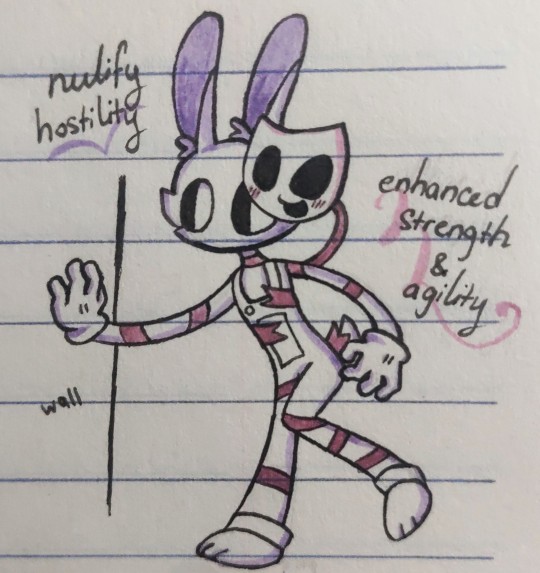

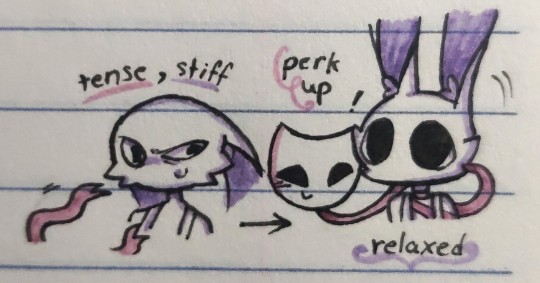
@rorydrawsandwrites's puppeteer au but the only difference is that jax gives consent
My contribution to this wonderful au has been long overdue:')
Rambling in tags ehe (cw: ribbun:p)
Well maybe it's not the only difference
#I think in this version of the au possesion puts you into an almost dream-like state#Slipping into a sort of weird trance#Like physically you still have control of your body#But mentally you're mindlessly following orders from a disembodied voice#Kinda works like that imperius curse in harry potter (yes ik rowling sucks)#And jax soon figured out it was great for dissasociating😀#Escapism and heavily dependant on those possesion sessions to preserve his own mental stability:')#But *cue dramatic music🥁*#He eventually realises that it was not the possesion that brings him comfort and peace no more#But the presence and embrace of gangle that did<3💖💗💞#Jskhsskhj sorry that was so cheesy🧀#Well more or less its because he hadnt have human interaction in AWHILE it seems#Goose did confirm that it has been a long time since he last got a hug:(#*almost* made me feel bad there#Mkay enough rambling about this slight very minor variation of the story#I hope this whole thing was coherent to even be readable=]#Maybe ill even add emojis✨#tadc gangle#tadc jax#ribbun#the amazing digital circus#Tadc au#tadc fanart#tadc fandom#gangle x jax#jax x gangle#Let me have this guys#Let me indulge-#Her head is a tad bit too small yes IM AWARE#This is actually probably my fastest post to reach 100 notes wth (in like 7-8 hours)
483 notes
·
View notes
Text

charmed, i'm sure
#homestuck#hom3stuck#jake english#dirk strider#dirkjake#jakedirk#admin draws#fanart#thats what you get for shrimping bro. i told you about the shrimping#to anyone whos been around for a while you can tell im quite obviously obsessed with that pose. that specific way of hugging urself#dirk was never escaping that#i need to draw some janeroxy too it bangs sm and i need to balance out this sausage party ive had going on in my head for the last xyz#how long has it been. how many weeks since ive seen natural light.#whatever.#id keep this to post in a batch with other drawings but it did well on its own on twt so i might as well post it here as is#feel like batchposting several basically finished drawings doesnt do me much good anyways. better serves smaller sketches on the same theme#ramble ramble
1K notes
·
View notes
Note
I have encountered issues with JVP in the past in regards to not accommodating kashrut/shabbat observance (and wheelchairs), but previously hasn’t heard about the Mikvah thing. Do you have any sources I can refer to?
Oh boy. Oh boy oh boy oh boy. The noise I made when I saw this ask.
You are probably unaware but I have literally been working on a post on this topic since February. Bless you for asking me about it and giving me a reason to share it. Genuinely. I'm delighted.
Without further ado, now that I've finally finished:
On the JVP Mikveh BS
Some of you are no doubt aware of the Jewish Voice for Peace Mikveh Guide (on JVP’s website here, and here on the Wayback Machine in case that link breaks). You may have seen the post I reblogged about it, you may have seen the post about JVP in general on @is-the-thing-actually-Jewish, or you may have heard about it elsewhere. Or maybe you’ve somehow managed to avoid all knowledge of its existence. (God I wish that were me.) Even if you know about it, even if you’ve scanned through it, you probably haven’t taken the time to read it through properly.
I have.
God help me.
I was originally looking through it to help draft the @is-the-thing-actually-Jewish post back in February, but some terrible combination of horror, indignation, and probably masochism compelled me to do a close reading, so that I could write this analysis and share it with you, dear readers. For those of you who’ve never heard of a mikvah, for those of you who’ve immersed in one, for those of you who’ve studied it intensely—I give you this, the fruit of my suffering, so you too can understand why “Mikveh: A Purification Ritual for Personal and Collective Transformation,” written by Zohar Lev Cunningham and Rebekah Erev for Jewish Voice for Peace has got so many people up in arms.
Brace yourselves. It’s going to be a long journey.
First off, a disclaimer: When I say something is “required in Jewish law” or whatnot, I’m talking about in traditional practice / Torah-observant communities; what is often called “Orthodox.” There’s a wide range of Jewish practice, and what is required in frum (observant) Judaism may not be required in Reform Judaism, etc. Don’t at me.
Second note: I myself am Modern Orthodox, and come from that perspective. I’m also very much more on the rationalist side than the mysticism side of things. I did run this past people from other communities. Still, if I’ve missed or misrepresented something, it was my error and was not meant maliciously.
Third: I am not a rabbi. I am a nerd who likes explaining things and doing deep dives. Again, I may have made errors–please let me know if you spot any, and I’d be happy to discuss them.
Now then. Before we get into the text itself, let’s give some background.
WHAT IS THIS MIKVEH THING ANYWAY?
A mikveh (or mikvah, both they and I switch between spellings; plural mikva’ot) is a Jewish ritual bath, sometimes translated as an immersion pool. Some communities or organizations that run mikva’ot will have a single all-purpose all-purpose, some have separate human- and utensil-pools, and some have separate women’s and men’s pools. The majority of the water in a mikvah has to be “living waters,” i.e. naturally collected rather than from a tap or a bucket. Some natural bodies of water can also be used, such as the ocean and some rivers (ask your local rabbi). The construction is complicated and has extremely detailed requirements. Here’s an example of a modern mikvah:

(By Wikimedia Commons (ויקיגמדון) - Own work, Public Domain, https://commons.wikimedia.org/w/index.php?curid=17373540)
Whoever is being dunked (the scientific term) has to be entirely immersed, and the water has to be in direct contact with all of them. That means no clothes, no makeup, no hair floating on the top of the water, no feet touching the floor, no clenched fists. You have to be completely clean as well, so no dirt is obstructing you from the water.
In essence, a person or thing is immersed in a mikvah to change their/its state from tameh (ritually “impure”) to tahor (ritually “pure”). I use quotes because “pure/impure” aren’t really good translations—they have value judgments that tameh/tahor don’t. There’s nothing wrong with being tameh, you aren’t lesser because you are tameh—it’s just a state one enters when one comes into contact with death and related concepts. (There are also different levels of both.) As a matter of fact, technically speaking even after going to a mikvah basically all people are tameh now—the tum’ah (“impurity,” sort of) that comes from contact with dead humans can only be removed by the Red Heifer offering (see Numbers 19), which we can’t do without the Temple. (Why I say “all” even if you’ve never been to a funeral is a much much longer tangent that I’ll spare you for now.) To quote one of my editors on this, mikvah is “about the natural oscillation between states of ritual purity and impurity. Men go to mikveh after having seminal emissions. Menstruating women go to mikveh on a monthly basis (emphasis added).” It’s just states of life.
In the days of the Temple, one had to be tahor to enter it (the Temple). Archaeologists have found a ton of ancient mikva’ot in Jerusalem that were presumably used by people visiting the Temple, which personally I think is extremely cool.
Nowadays, there are three main traditionally required uses for a mikvah. First, and most importantly, observant married women will go about once a month as part of their niddah (menstrual) cycle, part of practice known as Taharat HaMishpacha, or “Family ‘Purity,’” which at its root is a way to sanctify the relationship between spouses. Until she immerses, a wife and husband cannot resume relations. And not just sex—in some communities, they can’t sleep in the same bed or even have any physical contact at all.
The second use is for conversion—immersion is a central part of the conversion ceremony. One enters the water a gentile, and emerges a Jew.
The third usage is a bit different as it’s not for people. Tableware—plates, cups, etc.—made of certain materials have to be immersed before they can be used. This isn’t what the Guide is about, so I’m not going to go into that as much, but felt remiss if I didn’t mention it was a thing. If you want to know more, Chabad has an article on it here.
Aside from uses required by Jewish law, there is a strong tradition in some communities for men to go to the mikveh just before Yom Kippur, or sometimes every week before the Sabbath, to enter the holiday in as “pure” a state as possible these days. (The things they’re “purifying” from still made them tameh, it just matters less without the Temple.) There is also a strong custom to immerse before one’s wedding. Less traditional communities have also started using mikvah for other transitional moments, such as significant birthdays or remission from cancer. There has recently been an “open mikvah” movement, which “is committed to making mikveh accessible to Jews of all denominations, ages, genders, sexual orientations, and abilities (Rising Tide Network old website, “Why Open Mikvah”).”
To quote others:
No other religious establishment, structure or rite can affect the Jew in this way and, indeed, on such an essential level. —Rebbetzen Rivkah Slonim, Total Immersion, as quoted on Chabad.org
The mikveh is one of the most important parts of a Jewish community. —Kylie Ora Lobell, “What Is a Mikveh?” on Aish.com
How important? According to Rav Moshe Feinstein, one of the great American rabbis of the 20th century, one should build a mikveh before building a synagogue in a town that has neither, and even in a town where there is a mikveh but it’s an inconvenient distance away from the community (Igros Moshe: Choshen Mishpat Chelek 1 Siman 42).
A mikveh is more important than a synagogue.
I’d say that’s pretty important.
Tl;dr: A mikveh is the conduit through which a convert becomes a part of the Jewish people. It is traditionally used to sanctify the relationship between spouses. It was required for people to go to the Temple, back when we still had it. It is extremely central to Jewish practice.
So. What does JVP have to say about it?
THE JVP MIKVEH GUIDE
The document in question is titled “Mikveh: A Purification Ritual for Personal and Collective Transformation,” by Zohar Lev Cunningham and Rebekah Erev. I am largely going to quote directly from the text and then analyze and explain it.
Now let me be clear. I’m not trying to say the authors aren’t Jewish. I’m not saying they’re bad people, or that you should attack them. I am not intending any of this as an ad hominem attack. But given the contents of this document, I do think it is fair to call this appropriative, even if it is of their own culture—in the same way someone can have internalized racism, or twist feminism into being a TERF, I would argue that this is twisting Judaism into paganism. In fact, while I use “appropriation” throughout this document, an extremely useful term that’s been coined recently is “cultural expropriation”--essentially, appropriative actions done by rogue members of the community in question. One example of this would be the Kabbalah Centre in Los Angeles, which is the source of a lot of the Madonna-style “pop Kabbalah.” It was founded by an Orthodox Jewish couple, but it and its followers are widely criticized by most Jewish communities. In much the same way, the Guide is expropriation.
We start off with a note from the authors.
Hello, Welcome to the Simple Mikveh Guide. This work comes out of many years of reclaiming and re-visioning mikveh. The intention of this guide is to acknowledge and give some context to what mikveh is, provide resources related to mainstream understanding of mikveh and also provide alternative mikveh ideas. Blessings for enjoyment of this wonderful, simple Jewish ritual! Zohar Lev Cunningham & Rebekah Erev
This is fairly normal, though “alternative mikveh ideas” is a bit odd to say. I also find “blessings for enjoyment” to be odd phrasing, somewhat reminiscent of the Wiccan “Blessed Be,” but it could be a typo.
The first main section is titled “Intro to Mikveh,” and begins as follows:
Mikveh is an ancient Jewish ritual practice of water immersion, traditionally used for cleansing, purification, and transformation. It's been conventionally used for conversion to Judaism, for brides, and for niddah, the practice of cleansing after menstruation.
This is relatively accurate, and credit where credit is due avoids making niddah out to be patriarchal BS. I do object slightly to “purify” as a translation without further explanation, as I went into above, and “cleansing” for similar reasons—it implies “dirtiness,’ which isn’t really what tum’ah is about. Also, though this is pretty minor, a bride going to the mikveh before her wedding is actually a part of the laws of niddah. I’d also note that they entirely leave out that it was important for going to the Temple in ancient times, though given this is published by JVP I’m not terribly surprised.
For Jews, water signifies the transformative moment from slavery in Egypt, through the parted Red Sea, and into freedom.
On the one hand, I suppose it’s not unreasonable to connect the Red Sea and mikveh, though I think I’d be more likely to hear it the other way around (i.e. “going through the sea was like the people immersing in a mikveh and being ‘cleansed,’ so to speak”). Though they were, rather importantly, not actually immersed in the water. However I don’t think I’d say water as a whole signifies the Splitting of the Sea. In fact, water imagery is more often used to signify the Torah, see for instance Bava Kamma 82a.
There is also a mystical connection to mikveh as a metaphor for the womb of the divine.
A mikveh being like a womb is also not uncommon. It’s found in the Reishis Chochmah (Shia’ar HaAhavah 11,58) and the writing of Rabbi Aryeh Kaplan (The Aryeh Kaplan Anthology, vol 2., p. 382; both as quoted in 50 Mikvahs That Shaped History, by Rabbi Ephraim Meth), see also “The Mikveh’s Significance in Traditional Conversion” by Rabbi Maurice Lamm on myjewishlearning. Filled with water, you float in it, you emerge a new being (at least for conversion); it’s not an absurd comparison to draw. I’m not sure I’ve found anything for the Womb of the Divine specifically, though. (Also, Divine should definitely be capitalized.)
Entering a mikveh is a transformative and healing experience and we have long wondered why it is not available to more people, including the significant trans and queer populations in Jewish communities.
So. I am NOT going to say there’s no problem with homophobia and/or transphobia in Jewish communities. It’s definitely a community issue, and many communities are grappling with it in various ways as we speak. And I’m certainly not going to say the authors didn’t have the experience of not having a mikveh available to them—I don’t know their lives, I’m not going to police their experiences.
However, while Orthodox mikvahs are often still restricted to married women (who by virtue of the community will generally be cis and married to men) and potentially adult men (given the resources and customs, as mentioned above), there are plenty of more liberal mikva’ot these days. Some even explicitly offer rituals for queer events! The list of reasons to go to the mikvah linked up above, for instance, includes:

(Mayyim Hayyim, “Immersion Ceremonies”)
Again, that’s not to say there aren’t issues of queerphobia in the Jewish community, but if you are queer and want to go to the mikvah, there are options out there. If you’re looking, I’ve included some links at the end.
When we make ritual, we are working with the divine forces of presence and intention. The magic of mikveh comes in making contact with water. Contact with water marks a threshold and functions as a portal to bring closer our ritual intention/the world to come.
This is…a weird way to put things. I would say this is the start of the red flags. “When we make ritual,” first of all, is, to quote @the-library-alcove (who helped edit this), “a turn of phrase that is not typically associated with any branch of Jewish practice; we have a lot--a LOT--of rituals, and while it's certainly not completely outside of the realm of Jewish vernacular, the tone here, especially in light of the later sections, starts veering towards the vernacular of neo-paganism.” One might say “make kiddush” (the blessing over wine on Shabbos and holidays) or “make motzi” (the blessing over bread), but not generally “make ritual.”
The next section is titled “Who Gets to Do Mikveh?” Their answer:
Everyone! Mikveh practice is available to all of us as a healing tool at any time.
The healing tool part isn’t the original purpose of mikveh, but there are some who have used it as a part of emotional recovery from something traumatic, by marking a new state of being free from whatever caused it, see for instance Mayyim Hayyim’s list linked above.
The “everyone” bit is a little more complicated. To explain why, we’re going to skip ahead a little. (Some of these quotes will also be analyzed in full later.)
We want to make mikveh practice available as a tool to all Jews and non-Jews who want to heal wounds caused by white supremacy and colonialism. [..] To us, a queer mikveh welcomes anyone, regardless of spiritual background or not. […] Queer mikveh is accessible physically and spiritually to any and all people who are curious about it. You don't have to be a practicing Jew to enter queer mikveh. You don't have to be Jewish. (pg. 2, emphasis added)
Now, I am told there are mikva’ot that allow non-Jews to immerse. I have yet to find them, so I don’t know what rituals they allow non-Jews to do. I also haven’t been able to find any resources on non-Jews being allowed to immerse. I have found quite a few that explicitly prohibit it. If there are any sources you know of, please send them to me! I’d love to see them! But so far everything I have come across has said that mikvah immersion is a closed practice that only Jews can participate in. (Technically, to quote the lovely @etz-ashashiot, any non-Jew can do mikvah…once. And they won’t be non-Jews when they emerge. There is also one very extreme edge-case, which is absolutely not mainstream knowledge or practice, and basically isn’t actually done. You can message me if you’re curious, but it’s really not relevant to this–and even in that case, it is preferable to use a natural mikvah rather than a man-made one.)
If there are any legitimate sources that allow non-Jews to do a mikvah ritual, I would assume said non-Jews would be required to be respectful about it. Unfortunately, this is how the paragraph we began with continues:
Who Gets to Do Mikveh? Everyone! Mikveh practice is available to all of us as a healing tool at any time. You don't need any credentials. Your own wisdom is all the power you need to be a Jewish ritual leader. (emphasis added)
This is where we really go off the rails. First of all, you need more than “wisdom” to lead a Jewish ritual. You need to actually know what you’re doing. You can’t just say “oh you know what I feel like the right thing to do for morning prayers is to pray to the sun, because God created the sun so the sun is worth worshiping, and this is a Jewish ritual I’m doing.” That’s just idolatry. Like straight up I stole that from a midrash (oral tradition) about how humanity went from speaking with God in the Garden of Eden to worshiping idols in the time of Noah (given here by Maimonides; note that it continues for a few paragraphs after the one this link sends you to).
Second of all, this is particularly bad given this guide is explicitly to Jews and non-Jews. As @daughter-of-stories put it when she was going over an earlier draft of this analysis, “they are saying that non-Jews can just declare themselves Jewish ritual leaders based on nothing but their own ‘wisdom.’”
I hope I don’t need to explain why that’s extremely bad and gross?
While we’re on the topic of non-Jews using a mikvah, let’s take a moment to address an accusation commonly mentioned alongside the mikvah guide: that JVP also encourages (or encouraged) self-conversion.
I have been unable to find a separate document where they explicitly said so, or an older version of this document that does. This leads me to believe that either a) the accusation came from a misreading of this document, or b) there was a previous document that contained it which has since been deleted but was not archived in the Wayback Machine. EITHER is possible.
Even in the case that there was no such document, however, I would point out that such a suggestion can be read–intentionally or not–as implicit in this document. This is a guide for mikvah use by both Jews and non-Jews, and includes an idea that non-Jews can perform Jewish rituals on their own without any guidance or even background knowledge, as quoted above. Why would a non-Jew, coming into Jewish practice with very little knowledge, go looking to perform a mikvah ritual?
I would wager that the most well-known purpose of immersing in a mikvah is for the purpose of conversion.
Nowhere in this guide is there any explicit statement that you can do a self-conversion, but it also doesn’t say anywhere that you can’t, or that doing so is an exception to “you don’t need any credentials” or “your own wisdom is all the power you need to be a Jewish ritual leader.” It may not be their intention, but the phrasing clearly leaves it as an option.
Even if this were from a source that one otherwise loved, this would be upsetting and disappointing. The amount of exposure this document is getting may be at least in part because it comes from JVP, but the distress and dismay would be there regardless. If there is further vitriol, it’s only because JVP is often considered a legitimate source by outsiders, if no one else–in other words, by the very people least likely to have the background to know that this document isn’t trustworthy. It’s like the difference between your cousin telling you “the Aztecs were abducted by aliens” versus a mainstream news program like Fox reporting it. Both are frustrating and wrong, but one has significantly more potential harm than the other, and therefore is more likely to get widespread criticism (even if you complain about your cousin online).
On the other hand, as one of my editors pointed out in a moment of dark humor, they do say you don’t have to be Jewish to lead a Jewish ritual, so perhaps that mitigates this issue slightly by taking away a motivation to convert in the first place.
Returning to our document:
We do mikvahs in lakes, rivers, bathtubs, showers, outside in the rain, from teacups, and in our imaginations.
At this point the rails are but a distant memory.
In case you’ve forgotten what I said about this at the beginning of this post (and honestly I wouldn’t blame you, we’re on pg. 9 in my draft of this), there are extremely strict rules about what qualifies as a mikvah. Maimonides’s Mishnah Torah, just about the most comprehensive codex of Jewish law, has eleven chapters on the topic of the mikvah (though that includes immersion in it as well as construction of it). I’m not going to make you read through it, but let’s go through the list in this sentence:
Lakes and rivers: you might be able to use a river or lake as a mikvah, but you need to check with your local rabbinical authority, because not all of them qualify. In general, the waters must gather together naturally, from an underground spring or rainwater. In the latter case, the waters must be stationary rather than flowing. A river that dries up in a drought can’t be used, for instance. (The ocean counts as a spring, for this purpose.)
Bathtubs and showers: No. A man-made mikveh must be built into the ground or as an essential part of a building, unlike most bathtubs, and contain of a minimum of 200 gallons of rainwater, gathered and siphoned in a very particular way so as not to let it legally become “groundwater.” Also, it needs to be something you can immerse in, which a shower is not.
Outside in the rain: No? How would you even do that?? What??
Teacups: Even if you were Thumblina or K’tonton (Jewish Tom Thumb), and could actually immerse your entire body in a teacup, it wouldn’t be a kosher mikvah as a mivkah can’t be portable.
In your imagination: Obviously not, what the heck are you even talking about
We will (unfortunately) be coming back to the teacup thing, but for now suffice it to say most of these are extremely Not A Thing.
Mikveh has been continually practiced since ancient Judaism. It is an offering of unbroken Jewish lineage that we have claimed/reclaimed as our own.
I find the use of “claimed/reclaimed” fascinating here, given this guide is explicitly for non-Jews—who, whether or not they are permitted to use a mikvah, certainly shouldn’t be claiming it as their own—as well as Jews. I find it particularly interesting given the lack of clarity of how much of JVP’s membership is actually Jewish and JVP’s history of encouraging non-Jewish members to post “as Jews.” Kind of telling on yourselves a bit, there.
(Once again, I’m not commenting on the authors themselves, but the organization they represent here and the audience they are speaking to/for.)
We want to make mikveh practice available as a tool to all Jews and non-Jews who want to heal wounds caused by white supremacy and colonialism. We want to make mikveh practice available for healing our bodies, spirits, and the earth.
Setting aside the “Jews and non-Jews” thing, since I talked about that earlier and this is already extremely long, I do want to highlight the end of the paragraph. While there are some modern uses of the mikvah to (sort of) heal the spirit, I haven’t heard of anyone using a mikvah to heal the body—as a general rule Jews don’t tend to do faith healing, though of course some sects are the exception. Healing the earth, however, is absolutely not a use of a mikvah. Mikvah rituals, as we’ve now mentioned several times, are about tahara of a person or an object, and require immersion. You can’t immerse the earth in a mikvah. The earth contains mikva’ot. Healing the earth with a mikvah is a very strange worship (IYKYK).
We acknowledge that not all beings have consistent access to water, including Palestinians.
This is a tragedy, no question. I don't mean to minimize that. However, it is also unrelated to the matter at hand. The Guide also doesn’t give any recommendations on how we can help improve water access, so this lip service is all you get.
A lack of water does not make mikveh practice inaccessible.
Yes, in fact, it does. Without a kosher mikvah of one variety or another one cannot do anything that requires a mikvah. That’s why building a kosher one is so important. I haven’t gone looking for it, but while I’m sure there’s lots (and lots and lots and lots) of Rabbinic responsa out there of what to do in drought situations, you definitely do need water in all but the most extreme cases. If you do not have water, AYLR (Ask Your Local Rabbi)--don’t do whatever this is.
The spirit of water can be present with us if we choose to call for water, so even when water is not physically available to us we can engage in mikveh practice.
This is just straight up avodah zarah (“strange worship,” i.e. idolatry) as far as I can tell. The “spirit of the water”? What? We’re not Babylonians worshiping Tiamat. What source is there for this? Is there a source??
Like all material resources, the ways water is or is not available to us is shaped by our geographic and social locations. The ways we relate to water, what we decide is clean, treyf (dirty), drinkable, bathable, how much we use, how much we save, varies depending on our experiences. We invite you to decide what is clean and holy for your own body and spiritual practice.
This is going to require some breaking down.
To start with, let’s define “treyf.” To quote myjewishlearning, “Treyf (sometimes spelled treif or treyfe) is a Yiddish word used for something that is not kosher [lit. "fit"]. The word treyf is derived from the Hebrew word treifah, which appears several times in the Bible and means 'flesh torn by beasts.' The Torah prohibits eating flesh torn by beasts, and so the word treifah came to stand in for all forbidden foods.”
You may note the lack of the word “dirty” in this definition, or any other value judgments. Myjewishlearning continues, “over time, the words kosher and treyf have been used colloquially beyond the world of food to describe anything that Jews deem fit or unfit.” While this does have something of a value judgment, it’s still not “dirty.” I can’t say why the authors chose to translate the word this way, but…I don’t like it.
Now, when it comes to what is kosher or treyf, food and drink are most certainly not based on “our experiences.” There are entire books on the rules of kashrut; it generally takes years of study to understand all the minutiae. Even as someone who was raised in a kosher household, when I worked as a mashgicha (kosher certification inspector) I needed special training. What is considered kadosh (“sacred” or “holy,” though again that’s not a perfect translation) or tahor is also determined by very strict rules. We don’t just decide things based on “vibes.” That’s not how anything in Jewish practice works.
Water, in fact, is always kosher to drink unless it has bugs or something else treyf in it. And mikvehs aren’t even always what I’d consider “drinkable;” I always wash utensils I’ve brought to the mikvah before I use them.
We come to our next heading: What is Queer Mikveh?
What is Queer Mikveh? To us, a queer mikveh welcomes anyone, regardless of spiritual background or not.
As I’ve said above, I have yet to find a single source (seriously if you have one please send it to me) that says non-Jews can go to a mikvah. As one of my editors for this put it, “to spin appropriation of Jewish closed practices as ‘queer’ is not only icky but deeply disrespectful to actual queer Jews.”
Also, and this is not remotely the point, but “regardless of spiritual background or not” is almost incoherently poor writing.
As Jews in diaspora we want to share and use our ritual practices for healing the land and waters we are visitors on for the liberation of all beings.
I have tried to be semi-professional about this analysis, but. “Jews in the diaspora,” you say. Tell me, JVP, where are we in the diaspora from? Hm? Where are we in diaspora from? Which land do we come from? Which land are we indigenous to, JVP? Do tell.
Returning to the point, I would repeat that mikvah has nothing to do with “healing the land and waters.” It’s ritual purification of whatever is immersed in it. You want to heal the land and waters? Go to your local environmental group, and/or whoever maintains your local land and waters. Pick up trash. Start recycling. Weed invasive species. Call your government and tell them to support green energy. You want liberation for all beings? Fight bigotry—including antisemitism. Judaism believes in action—go act. Appropriating rituals from a closed religion doesn’t liberate anyone.
We have come up with this working definition and welcome feedback!
Oh good, maybe I won’t be yelled at for posting this (she said dubiously).
Queer mikveh is a ritual of Jews in diaspora. We believe the way we work for freedom for all beings is by using the gifts of our ancestors for the greatest good. We bring our rituals as gifts.
I have nothing in particular new to say about this, except that I find the idea of “bringing our rituals as gifts” for anyone to use deeply uncomfortable, given Judaism is a closed religion that strongly discourages non-Jews from joining us, and that has had literal millennia of people appropriating from us.
It acknowledges that our path is to live on lands that are not historically our peoples [sic] and we honor the Indigenous ancestors of the land we live on, doing mikveh as an anti-colonialist ritual for collective and personal liberation.
Again I would love so much for JVP to tell us which lands would historically be our people’s. What land do Jews come from, JVP? What land is it we do have a historical connection to? What land do our Indigenous ancestors come from??
And why does it have to be our path to live on lands other than that one?
Secondly, to quote the lovely @daughter-of-stories again when she was editing this, “Mikveh as anti-colonialism, aside from not being what Mikveh is, kinda implies that you can cleanse the land of the sins of colonialism. So (a) that’s just a weird bastardization of baptism since, mikveh isn’t about cleansing from sin, and (b) so does that mean the colonialism is erased? Now we don’t have to actually deal with how it affects actual indigenous people?”
I’m sure that (b) isn’t their intent, but I will say that once again they don’t give any material suggestions for how to actually liberate any collectives or persons from colonialism in this document, including any links to other pages on their own website*, which surely would have been easy enough. It comes across as very performative.
*I disagree strongly with most of their methods, but at least they are suggesting something.
Queer mikveh is a physical or spiritual space that uses the technologies of water and the Jewish practice of mikveh to mark transitions. Transition to be interpreted by individuals and individual ritual.
I have no idea what the “technologies of water” are. Also usage of a mikvah to mark transitions beyond ritual states is a fairly new innovation, as mentioned above.
Queer mikveh in it's [sic] essence honors the story of the water. The historical stories of the water we immerse in, the stories of our own bodies as water and the future story we vision [sic].
This just sounds like a pagan spinoff of baptism to me, if I’m being honest. Which would be non-Jewish in several ways.
Queer mikveh is accessible physically and spiritually to any and all people who are curious about it. You don't have to be a practicing Jew to enter queer mikveh. You don't have to be Jewish.
First off, once again whether or not non-Jews can use mikvah seems at best extremely iffy. Secondly, accessibility in mikva’ot is, as one of my editors put it, “a continual discussion.” We have records of discussions regarding access for those with physical disabilities going back at least to the 15th century (Shut Mahari Bruna, 106; as quoted in 50 Mikvahs That Shaped History by Rabbi Ephraim Meth), and in the modern era there are mikva’ot that have lifts or other accessibility aids. That said, many mikva’ot, especially older ones, are still not accessible–and many mikva’ot don’t have the money to retrofit or renovate. Mikvah.org’s directory listings (linked at the end of this) notes whether various mikva’ot are accessible, if you are looking for one in your area. If you want to help make mikva’ot more accessible to the disabled, consider donating to an existing mikvah to help them pay for renovations or otherwise (respectfully) getting involved in the community. If you want to help make mikva’ot more accessible for non-Orthodox Jews, try donating to an open mikvah (see link to a map of Rising Tide members at the end of this essay) or other non-Orthodox mikvah.
Queer mikveh is an earth and water honoring ritual.
Not even a little. We do have (or had) rituals that honor the earth or water, at least to an extent–the Simchat Beit HaSho’evah (explanations here and here) was a celebration surrounding water; most of our holidays are harvest festivals to some extent or another; there are a large number of agricultural mitzvahs (though most can only be done in Israel, which I suppose wouldn’t work for JVP). (Note: mitzvahs are commandments and/or good deeds.) Even those, though, aren’t about the water or earth on their own, per se, but rather about honoring them as God’s gift to us. This description of mikvah sounds more Pagan or Wiccan–which is fine, but isn’t Jewish.
Queer mikveh exists whenever a queer person or queers gather to do mikveh. Every person is their own spiritual authority and has the power to create their own ritual for individual or collective healing.
Absolutely, anyone can create their own rituals for anything they want. But it probably won’t be a mikvah ritual, and it probably won’t be Jewish.
Do you know what it’s called when you make up your own ritual and claim that it’s actually a completely valid part of an established closed practice of which you aren’t part? (Remember—this document is aimed just as much at non-Jews as at Jews.)
It’s called appropriation.
With the next section, “Some Ideas for Mikveh Preparation,” we begin page three.
(Yes, we’re only on page three of seven. I’m so sorry.)
The most important part of mikveh preparation is setting an intention.
This isn’t entirely wrong, as you do have to have in mind the intention of fulfilling a mitzvah when you perform one.
Because mikveh is a ritual most used to mark transitions, you can frame your intention in that way.
To quote myself above, “usage of a mikvah to mark transitions beyond ritual states is a fairly new innovation.” I’d hardly say it is mostly used for marking transitions.
You can do journaling or talk with friends to connect with the Jewish month, Jewish holiday, Shabbat, the moon phase, and elements of the season that would support your intention.
If this were a guide for only Jews, or there was some sort of note saying this section was only for Jews, I would have less of a problem. But given neither is true, they are encouraging non-Jews to use the Jewish calendar for what is, from the rest of the descriptions in the Guide, a magical earth healing ritual.
This is 100% straight up appropriation.
The Jewish calendar is Jewish. Marking the new moon and creating a calendar was the first commandment given to us as a people, upon the exodus from Egypt. Nearly all our holidays are (aside from the harvest component, which is based on the Israeli agricultural seasons and required harvest offerings) based on specific parts of Jewish history. Passover celebrates the Exodus and our becoming a nation. Sukkot celebrates the Clouds of Glory that protected us in the desert. Shavuot celebrates being given the Torah.
According to some opinions, non-Jews literally aren’t allowed to keep Shabbat.
If you are a non-Jew and you are basing the collective earth healing ritual you have created under your own spiritual authority around Jewish holidays and calling it “mikvah,” you are appropriating Judaism.
Full stop.
This isn’t even taking into account the generally Pagan/witchy feel of the paragraph, with “moon phases” and “elements of the season.” Again, if you want to be a Pagan be a Pagan, but don’t call it Jewish.
Things only go further downhill with their next suggestion for preparation before you go to the mikvah.
Divination: A lot can be said about divination practices and Judaism.
There certainly is a lot to be said. First and foremost, there’s the fact that divination is forbidden in Judaism.

(Screenshot of Leviticus 19:26 from sefaria.org)
One method of divination they suggest is Tarot, which is a European method of cartomancy that seems to have begun somewhere in the 19th century, though the cards start showing up around the 15th. While early occultists tried to tie it to various older forms of mysticism, including Kabbalah, this was, to put it lightly, complete nonsense. (Disclaimer: this information comes from wikipedia; I’ve already spent so much time researching the mikvah stuff that I do not have the energy or interest to do a deep dive into the origin of Tarot. It isn’t Jewish, the rest is honestly just details.)
I have nothing against Tarot. I think it’s neat! The cards are often lovely! I have a couple of decks myself, and I use them for fun and card games. But divination via tarot is not Jewish. If I do any spreads, I make it very clear to anyone I’m doing it with that it is for fun and/or as a self-reflection tool, not as magic. Because that is extremely not allowed in Judaism.
The authors suggest a few decks to use, one of which is by one of the authors themselves. Another is “The Kabbalah Deck,” which—holy appropriation, Batman!
In case anyone is unaware, Kabbalah (Jewish mysticism) is an extremely closed Jewish practice, even within Judaism. Traditionally it shouldn’t be studied by anyone who hasn’t already studied every other Jewish text (of which there are, I remind you, a lot), because it’s so easy to misinterpret. I mentioned this above briefly when explaining cultural expropriation. Pop Kabbalah (what Madonna does, what you see when they talk about “Ancient Kabbalistic Texts” on shows like Supernatural, the nonsense occultists and New-Agers like to say is “ancient Kabbalistic” whatever, it’s a wide span of appropriative BS) is gross, combining Kabbalah with Tarot is extremely gross. I’m not 100% sure, as the link in the pdf doesn’t work, but I believe they are referring to this deck by Edward Hoffman. For those of you who don’t want to click through, the Amazon description includes this:

(Screenshot from Amazon)
Returning to our text:
Another practice that's been used in Judaism for centuries is bibliomancy. You can use a book you find meaningful (or the Torah) and ask a question. Then, close your eyes, open the book to a page and place your finger down. Interpret the word or sentence you pointed at to help guide you to answer your question.
Bibliomancy with a chumash (Pentateuch) or tanach (Bible) in Jewish magic is kind of a thing, but the tradition of Jewish magic as a whole is very complicated and could be its own entirely different post. This one is already long enough. This usage of bibliomancy is clearly just appropriative new-age BS, though, especially given you can use “[any] book you find meaningful.”
Also, if you aren’t Jewish, please don’t use the Torah for ritual purposes unless you are doing it under very specific circumstances under the laws for B’nei Noach (“Children of Noah,” also called Righteous Gentiles; non-Jews who follow the 7 Noachide Laws).
Sit with your general intention or if you aren't sure, pose a question to the divination tool you are using. "What should be my intention for this mikveh?" "What needs transforming in my life?" "How can I transform my relationship with my body?"
As I hope I’ve made clear, there are very specific times when one uses a mikvah, even with more modern Open Mikvah rituals. You always know what your intention is well before going—to make yourself tahor, or mark a specific event. I’m not here to police how someone prepares mentally before they immerse—meditation is fine, even encouraged. But magic? Like this? That’s not a thing. And given the fact that divination specifically is not only discouraged but forbidden, this section in particular upset a lot of Jews who read it.
Those of us already upset by everything we’ve already covered were not comforted by how the Guide continues.
How to Prepare Physically For Mikveh: Some people like to think about entering the mikveh in the way their body was when they were born. By this we mean naked, without jewelry, with clean fingernails and brushed hair. This framing can be meaningful for many people.
We went into this at the beginning of this essay (about 6500 words ago), but this is in fact how Jewish law mandates one is required to immerse. This is certainly the case in most communities, whether you are immersing due to an obligation (as a married woman or a bride about to be married) or due to custom (as men in post-Temple practice) or due to non-traditional immersion (as someone coming out); wherever on the spectrum of observance one falls (as far as I could find). A mikvah isn’t a bath, it’s not about physical cleanliness—you must first thoroughly clean yourself, clip your nails, and brush your teeth. Nail polish and makeup are removed. There can’t be any barriers between you and the water. Most mikva’ot these days, particularly women’s mikva’ot, have preparation rooms so you can prep on site. When you immerse, you have to submerge completely—your hair can’t be floating above the water, your mouth can’t be pursed tightly, your hands can’t be clenched so the water can’t get to your palms. If you do it wrong, it doesn’t count and you have to do it again. It’s not a “framing,” it’s a ritual practice governed by ritual law.
We suggest you do mikveh in the way you feel comfortable for you and your experience.
This isn’t how this works. If you have a particularly extreme case, you can talk to a rabbi to see if there are any workarounds—for example, if excessive embarrassment would distract you from the ritual, you may be able to wear clothes that are loose enough that the water still makes contact with every millimeter of skin. But you need to consult with someone who knows the minutiae of the laws and requirements so you know if any exceptions or workarounds apply to you. That’s what a rabbi is for. That’s why they need to go to rabbinical school and get ordination. They have to study. That’s why you need to find a rabbi whose knowledge and personality you trust. For someone calling themselves a religious authority in Judaism to say “you can do whatever, no biggie” with such a critical ritual is…I’m not sure what the word I want is.
The idea is to feel vulnerable but also to claim your body as a powerful site of change that has the power to move us close to our now unrecognizable futures.
The idea is to bathe in the living waters and enter a state of taharah. Though that could be an idea you have in mind while you are doing it, I suppose. I could see at least one writer I know of saying something like this to specifically menstrual married (presumably cis) women performing Taharat HaMishpacha (family taharah, see above).
For some people, doing mikveh in drag will feel most vulnerable, with all your make-up and best attire.
Absolutely not a thing. As I said last paragraph, the goal isn’t to feel vulnerable or powerful or anything. It may feel vulnerable or powerful, but that is entirely besides the actual purpose of the ritual. What you get out of it on a personal emotional level has nothing to do with the religious goal of the religious practice.
And if you are wondering how one would submerge oneself in water in full drag, don’t worry, we’ll get there soon.
For some, wearing a cloth around your body until just before you dip is meaningful.
This is just how it’s usually done. Generally one is provided with a bathrobe, and one removes it before entering. You don’t just wander around the building naked. Or the beach, if you’re using the ocean.
If you were born intersex and your genitalia was changed without your consent, thinking about your body as perfect, however you were born, can be loving.
I’m not intersex, so I’m not going to comment on the specifics here. If you are and that’s meaningful to you, more power to you.
We enter a new section, at the top of page 4.
Where To Do Mikveh: There is much midrash around what constitutes a mikveh.
“Midrash” is not the word they want here. The midrash is the non-legal side of the oral tradition, often taking the form of allegory or parable. This is as opposed to the mishna, which is the halachic (legal) side of the oral tradition. They were both written down around the same time, but most midrashim (plural) are in their own books, rather than incorporated in the mishna.
There is, however, a great deal of rabbinic discussion, in the form of mishna, gemara, teshuvot (responsa), legal codices, and various other genres of Jewish writing. More properly this could have just said “there is much discussion around what constitutes a mikveh.”
Most mikvot currently exist in Orthodox synagogues[—]
This is perhaps a minor quibble, but I don’t know that I’d say they’re generally in synagogues. They are frequently associated with a local congregation, but are often in a separate building.
[—]but there is a growing movement to create more diverse and inclusive spaces for mikveh. Mayyim Hayyim is a wonderful resource with a physical body of water mikveh space. Immerse NYC is a newer organization training people of all genders to be mikveh guides. They also work to find gender inclusive spaces for people to do mikveh in NYC.
This is true! Mayyim Hayyim is a wonderful organization I’ve never heard anything bad about, and ImmerseNYC also seems like an excellent organization. Both also only allow Jews (in which group I am including in-process converts) to immerse.
The mikveh guides thing I didn’t explain above, so I’ll take a moment to do so here. Because the rules of immersion are so strict, and because it’s hard to tell if you are completely immersed when you are underwater, most mikva’ot have a guide helping you. Depending on the circumstance and the mikvah, and depending on the patron’s comfort, who and how they do their jobs can differ somewhat. For a woman immersing after niddah, it will usually be another woman who will hold up the towel or bathrobe for you while you get in the water, and will only look from behind it once you are immersed to make sure you are completely submerged. If you are converting, customs vary. Some communities require men to witness the immersion regardless of the convert’s gender, which is very much an ongoing discussion in those communities. Even in those cases, to my knowledge they will only look once the convert is in the water, and there will likely still be a female attendant if the convert is a woman. While there are negative experiences people have had, it is very much an intra-community issue. We’re working on it.
Mikveh can be done in a natural body of water.
Again, this is true, though not all bodies of water work, so AYLR (Ask Your Local Rabbi).
Some people are also making swimming pools holy places of mikveh.
We’ve already explained above why this is nonsense.
In the Mishneh (the book that makes commentary on the torah [sic]) there are arguments as to what constitutes a mikveh and how much water from a spring or well or rainwater must be present.
The main issue in this section is their definition of the Mishneh. As I explained above, the Mishna (same thing, transliteration is not an exact science) is the major compilation of the Oral Torah, the oral tradition that was written down by Rabbi Judah Ha-Nasi so it wouldn’t be lost in the face of exile and assimilation. It’s not so much a commentary on the (Written) Torah as an expansion of it to extrapolate the religious laws we follow. It’s certainly not “the book that makes commentary on the Torah.” We have literally hundreds of books of commentary. That’s probably underestimating. Jews have been around for a long time, and we have been analyzing and discussing the Torah for nearly as long. There are so many commentaries on the Torah.
The second issue is that while there are arguments in the Mishna and Gemara (the oral discussion on the Mishna that was written down even later), they do generally result in a final decision of some sort. Usually whichever side has the majority wins. Variations between communities are still very much a thing, and I can explain why in another post if people are interested, but there usually is a base agreement.
We are of the school that says you decide for yourself what works.
The phrasing they use here makes it sound as though that��s a legitimate opinion in the Mishnah. I cannot emphasize how much that is not the case. While I myself have not finished learning the entire Mishnah, I would be willing to wager a great deal that “whatever works for you” isn’t a stance on any legal matter there. That’s just not how it works. While some modern branches of Judaism may have that as a position, it is definitely not Mishnaic.
If you are concerned about Jewish law, the ocean is always a good choice. There are no conflicting arguments about the ocean as a mikveh. As the wise maggid Jhos Singer says in reference to the ocean, "It's [sic] becomes a mikveh when we call it a mikveh." Done.
(To clarify, I don’t know if that typo was carried over from the source of the original quote or not.)
This is true. However if you are concerned about Jewish law I would very much urge you to look to other sources than this one—be that your local rabbi or rebbetzen, the staff at your local mikvah, or a reliable website that actually goes into the proper requirements. If you want to use a mikveh according to Jewish law, please do not use this document as your guide.
We recognize immersion in water does not work for every body. Therefore, a guiding principle for where to do a mikveh is: do a mikveh in a place that is sacred to you. Your body is always holy and your body is made of mostly water. Later in this guide there is more information on mikveh with no immersion required.
I cannot emphasize how much I have never once heard this before. This, to me, reads like New Age nonsense. If you are unable to immerse in a mikvah, talk to your rabbi. Don’t do…whatever this is.
Our next section is a short one.
Who To Do it With: Do mikveh with people you feel comfortable with and supported by.
This is fine, though many mikva’ot (perhaps even most) will only allow one person to immerse at a time.
Do a solo mikveh and ask the earth body to be your witness.
With this, we return to the strange smattering of neo-Paganism. The “earth body” is not a thing. Yes, the Earth is called as a witness in the Bible at least once. It’s poetic. You also, unless you are converting, don’t actually need a witness anyway. A mikvah attendant or guide is there to help you—if you were somewhere without one, you could still immerse for niddah or various customary purposes.
Do mikveh with people who share some of your vision for collective healing.
As I’ve said before in this essay, collective healing is not the point of a mikvah. If you are Jewish and want to pray for healing, there are plenty of legitimate places for this–the Shemonah Esrei has a prayer for healing and a prayer where you can insert any personal prayers you want; there’s a communal prayer for healing after the Torah reading. You can give charity or recite a psalm or do a mitzvah with the person in mind. You can also just do a personal private prayer with any words you like, a la Hannah, or if you want pre-written words find an appropriate techinah (not the sesame stuff). If you want to work towards collective liberation, volunteer. Learn the laws of interpersonal mitzvot, like lashon hara (literally “evil speech,” mostly gossip or libel). Connect fighting oppression to loving your neighbor or the Passover seder. We have tons of places for this–mikvah isn’t one of them.
Next segment.
What To Bring to A Mikveh: 1. Intentions for the ritual for yourself and/or the collective.
See previous points on intention.
2. Items for the altar from your cultural background[…] (emphasis mine)
If I wasn’t appalled by the “immersing in makeup” or the “do divination first,” this would be the place that got me. This is wrong on so many levels.
One is not allowed to have an altar outside of The Temple in Jerusalem, the one we currently do not have. It’s an extremely big deal. One is not allowed to make sacrifices outside of the Temple. Period. This is emphasized again and again in the Torah and other texts. Even when we had a Temple, there were no altars in a mikvah.
And you certainly couldn’t offer anything in the Temple while naked, as one is required to be when immersing in the mikvah.
Even when we did bring offerings to altars (the Bronze Altar or the Gold Altar, both of which were in the Temple and which only qualified priests in a state of tahara could perform offerings on), the offerings were very specifically mandated, as per the Torah and those other texts. Even when non-Jews gave offerings (as did happen) they were required to comply. You couldn’t just bring any item from your cultural background. This is paganism, plain and simple.
Now, again, let me be clear: if you’re pagan, I have no problem with you. My problem is when one tries to take a sacred practice from a closed religion and try to co-opt it as one’s own. It’s a problem when someone who isn’t Native American decides to smudge their room with white sage, and it’s a problem when someone who isn’t Jewish tries to turn a mikvah into a pagan cleansing rite. And even if the person doing it is Jewish--I have an issue when it’s Messianics who were born Jewish, and I have an issue when it’s pagans who were born the same. Either way, whether you intend to or not, you are participating in appropriation or expropriation.
Which makes the line that follows this point so deeply ironic I can’t decide if I’m furious or heartbroken.
After suggesting that the reader (who may or may not be Jewish) bring items for an altar to a mikvah, the Guide asks:
[…] (please do not bring appropriated items from cultures that are not yours).
Which is simply just... beyond parody. To quote one of my editors, “This is quickly approaching the level of being a new definition for the Yiddish word 'Chutzpah,' which is traditionally defined as 'absurdist audacity' in line with 'Chutzpah is a man who brutally murders both of his parents and then pleads with the judge for leniency because he is now an orphan bereft of parental guidance.' If not for the involved nature of explaining the full context, I would submit this as a potential new illustrative example.”
The next suggestion of what to bring is
3. Warm clothes, towels, warm drinks
All these are reasonable enough, though most mikva’ot provide towels. Some also provide snacks, for while you are preparing. They may also not allow you to bring in outside food.
4. Your spirit of love, healing, and resistance
This, again, has nothing to do with mikvah. The only spirit of resistance in a mikvah is the fact that we continue to do it despite millennia of attempts to stop us. Additionally, to me at least “a spirit of love” feels very culturally-Christian.
Our next section is titled “How to Make Mikveh a Non-Zionist Ritual.”
Right off the bat, I have an issue with this concept. Putting aside for a moment whatever one may think of Zionism as a philosophy, my main problem here is that mikvah has nothing at all to do with Zionism. In Orthodoxy, at least, Jews who are against Zionism on religious grounds perform the mitzvah the same way passionately Zionist Jews do, with the same meanings and intentions behind it. It is performed the same way in Israel and out, and has been more or less the same for the last several thousand years. It is about ritual purification and sanctification of the mundane, no more and no less.
There is a word for saying anything and everything Jewish is actually about the modern Israel/Palestine conflict, simply because it’s Jewish.
That word is antisemitism.
How to Make Mikveh a Non-Zionist Ritual: Reject all colonial projects by learning about, naming & honoring, and materially supporting the communities indigenous to the land where you hold your mikveh. Name and thank the Indigenous people of the land you are going to do your mikveh on.
If you removed the “non-Zionist” description, this would be mostly unobjectionable. We should absolutely help indigenous communities. The framing of “reject all colonial projects” does seem to suggest that there is something colonial about the usual practice of going to the mikvah, though. I would argue that the mikvah is, in fact, anti-colonial if anything—it is the practice of a consistently oppressed minority ethno-religion which has kept it in practice despite the best efforts of multiple empires. Additionally, while Zionism means many different things to those who believe in it, at its root most Zionists (myself included) define it as “the belief that Jews have a right to self-determination in our indigenous homeland.” Our indigenous homeland being, of course, the land of Israel. (This is different from the State of Israel, which is the modern country on that land.) If you are a Jew in Israel, one of the indigenous peoples of the land your mikvah is on is your own. That’s not to say there aren’t others—but to claim Jews aren’t indigenous to the region is to be either misinformed or disingenuous.
Take the time to vision [sic] our world to come in which Palestine and all people are free.
I really, really dislike how they use the concept of The World To Come here. The Jewish idea of The World To Come (AKA the Messianic Age) is one where the Messiah has come, the Temple has been rebuilt, and the Davidic dynastic monarchy has been re-established in the land of Israel. Arguably that’s the most Zionist vision imaginable. This isn’t to say that all people, Palestinians included, won’t be free—true peace and harmony are also generally accepted features of the Messianic Age. But using the phrase in making something “non-Zionist” is, at the very least, in extremely poor taste. (As a side note, even religious non-Zionists believe in this–that’s actually why most of them are against the State of Israel, as they believe we can’t have sovereignty until the Messiah comes. They do generally believe we will eventually have sovereignty, just that now isn’t the time for it.)
Hold and explore this vision intimately as you prepare to immerse. What is one action you can take to bring this future world closer? Trust that your vision is collaborating with countless others doing this work.
Having a “vision” of a world where all are free isn’t doing any of the work to accomplish it. A “vision” can’t collaborate. At least not in Judaism. This sounds like one is trying to manifest the change through force of will, which is something directly out of the New Age faith movement, where it is known as “Creative Visualization.” Even when we do have a concept of bringing about something positive through an unrelated action–like saying psalms for someone who is sick–the idea is that you are doing a mitzvah on their behalf, to add to their merits counted in their favor. It’s not a form of magic or invocation of some mystical energy.
(Once again: I have nothing against pagans. But paganism is incompatible with Judaism. You can’t be both, any more than you can be Jewish and Christian.)
Use mikveh practice to ground into your contribution to the abundant work for liberation being done. We are many.
If you will once more pardon a brief switch to a casual tone:
Nothing says liberation like *checks notes* appropriating a minority cultural practice.
The next section of their document is titled “Ideas for Mikveh Ritual,” and this is where the Neo-Pagan and New Age influences of the authors truly shift from the background to the foreground.
We start off deceptively reasonably.
Mikveh ritual is potentially very simple. Generally people consider a mikveh to be a full immersion in water, where you are floating in the water, not touching the bottom, with no part of the body above the surface (including the hair).
Technically, most people consider a mikveh to be a ritual bath (noun) in which one performs various Jewish ritual immersions. But if we set this aside as a typo, this is…fairly true. What they are describing is how one is supposed to perform the mitzvah of mikveh immersion. However, in much the same way I wouldn’t say “generally people consider baseball to be a game where you hit a ball with a bat and run around a diamond,” I wouldn’t say it’s a case of “generally people consider” so much as “this is what it is.”
This works for some people. It doesn't work for everyone and it doesn't work for all bodies. Because of this, mikveh ritual can be expanded outside of these traditional confines in exciting, creative ways.
Once again, if you are incapable of performing mikvah immersion in the proper manner, please go speak with a rabbi. Please do not follow this guide.
Before we continue, I would just like to assure you that. whatever “exciting, creative ways” you might be imagining the authors have come up with, this is so much worse.
Method One:
Sound Mikveh: One way that's felt very meaningful for many is a "sound mikveh." This can be a group of people toning, harmonizing, or chanting in a circle. One person at a time can be in the center of the circle and feel the vibrations of healing sound wash over their body. Another method of sound mikveh is to use a shofar or other instrument of your lineage to made [sic] sounds that reach a body of water and also wash over you.
This makes me so uncomfortable I barely have the words to describe it, and I know that I am not alone in this. This is not a mikvah. If someone wants to do some sort of sound-based healing ritual, by all means go ahead, but do not call it a mikvah. This is not Jewish. I don’t know what this is, aside from deeply offensive.
And leave that poor shofar out of this. That ram did not give his horn for this nonsense.
(I could go on about the actual sacred purpose of a shofar and all the rules and reasons behind it that expand upon this, but this is already over 9000 words.)
Method Two is, if anything, worse. This is the one, if you’ve seen social media posts about this topic, you have most likely seen people going nuts about.
Tea Cup Mikveh: Fill a special teacup. If you want, add flower essence, a small stone, or other special elements. Sing the teacup a sweet song, dance around it, cry in some tears, tell the cup a tender and hopeful story, hold the teacup above the body of your animal friend for extra blessing, balance it on your head to call in your highest self. Use the holy contents of this teacup to make contact with water.
This is absolutely 100% straight-up neo-pagan/New Age mysticism. Nothing about this is based on Jewish practice of any kind. Again, I’m at a loss for words of how to explain just how antithetical this is. If you want to be a witch, go ahead and be a witch. But do not call it Jewish. Leave Judaism out of this.
They end this suggestion with the cute comment,
Mikveh to go. We’ve always been people on the move.
Let me explain why this “fun” little comment fills me with rage.
As you may recall, this document was published by Jewish Voice for Peace. Among their various other acts of promoting and justifying antisemitism, JVP has repeatedly engaged in historical revisionism regarding Jews and Jewish history. In this context, they have repeatedly ignored the numerous expulsions of Jews from various countries, and blaming sinister Zionist plots to explain any movement of expelled Jews to Israel (“In the early 1950s, starting two years after the Nakba, the Israeli government facilitated a mass immigration of Mizrahim,” from “Our Approach to Zionism” on the JVP website; see @is-the-thing-actually-jewish’s post on JVP and the posts linked from there).
So a document published by JVP framing Jewish movement as some form of free spirited 1970s-esque Bohemian lifestyle or the result of us being busy movers-and-shakers is a direct slap in the face to the persecution we’ve faced as a people and society. No, we aren’t “on the move” because we’re hippies wandering where the wind takes us . We’re always on the move because we keep getting kicked out and/or hate-crimed until we leave.
But there is no Jew-hatred in Ba Sing Se.
Method three:
Fermentation Mikveh: Some food goes through natural changes by being immersed in water. If we eat that food, we can symbolically go through a change similar to the one the food went through.
Again, this has no basis anywhere in halacha. We do have concepts of “you are what you eat,” specifically with reference to what animals and birds are kosher, but there isn’t any food that makes you tahor if you eat it. In the Temple days there were, in fact, foods you couldn’t eat unless you were tahor.
Jews may like pickles, but that doesn’t mean we think they purify you.
Also, the change from fermentation is, if anything, the opposite of the change we would want. Leavening (rising in dough or batter, due to the fermentation of yeast) is compared in rabbinic writings to arrogance and ego, as opposed to the humility of matza, the “poor man’s bread” (see here, for example). Is the suggestion here to become more egotistical?
As we wrap up this section, I’d like to go back to their stated reason for using these “alternative” methods (“It doesn't work for everyone and it doesn't work for all bodies”), and ask: if these really were the only options for immersion, would these really fill that same spiritual need/niche? These obviously aren’t aimed at me, but from my perspective it seems almost condescending, almost worse. “You can’t do the real thing, so we’ll make up something to make you feel better.” If any of them had an actual basis in Jewish practice, that would be one thing, but this just feels…fake, to me. Even within more liberal / less traditional streams of Judaism, there is a connection to halacha:
“We each (if we are knowledgeable about the tradition, if we confront it seriously and take its claims and its wisdom seriously) have the ability, the freedom, indeed the responsibility to come to a [potentially differing] personal understanding of what God wants us to do… [Halacha] is a record of how our people, in widely differing times, places and societal circumstances, experienced God's presence in their lives, and responded. Each aspect of halacha is a possible gateway to experience of the holy, the spiritual. Each aspect worked for some Jews, once upon a time, somewhere in our history. Each, therefore, has the potential to open up holiness for people in our time as well, and for me personally. However, each does not have equal claim on us, on me…Portions of the halacha whose main purpose seems to be to distance us from our surroundings no longer seem functional. Yet some parts of the halachic tradition seem perfect correctives to the imbalances of life in modernity…In those parts of tradition, we are sometimes blessed to experience a sense of God's closeness. In my personal life, I emphasize those areas. And other areas of halacha, I de-emphasize, or sometimes abandon. Reform Judaism affirms my right, our right, to make those kinds of choices.” – Rabbi Ramie Arian
“[Traditional Reconstructionist Jews] believe that moral and spiritual faculties are actualized best when the individual makes conscious choices…The individual’s choices, however, can and should not be made alone. Our ethical values and ritual propensities are shaped by the culture and community in which we live. Living a Jewish life, according to the Reconstructionist understanding, means belonging to the Jewish people as a whole and to a particular community of Jews, through which our views of life are shaped. Thus, while Reconstructionist communities are neither authoritarian nor coercive, they aspire to influence the individual’s ethical and ritual choices–through study of Jewish sources, through the sharing of values and experiences, and through the impact of the climate of communal opinion on the individual. …While we may share certain values and life situations, no two sets of circumstances are identical. We hope that the Reconstructionist process works to help people find the right answers for themselves, but we can only assist in helping individuals to ask the right questions so that their choices are made in an informed way within a Jewish context. To be true to ourselves we must understand the differences in perception between us and those who have gone before, while retaining a reverence for the traditions they fashioned. If we can juxtapose those things, we ensure that the past will have [in the phrase of Reconstructionism’s founder, Mordecai Kaplan,] a vote, but not a veto.” – Rabbi Jacob J. Straub (Note: the Reconstructionist movement was founded in the late 1920s, and has gone through a very large shift in the past decade or so. I use “Traditional” here to refer to the original version of the movement as opposed to those who have shifted. Both are still called Reconstructionist, so it’s a bit confusing. This is on the advice of one of my editors, who is themself Traditional Reconstructionist.)
You may note, neither of these talk about inventing things from whole cloth. To paraphrase one of my editors, “You don’t completely abandon [halacha], because if you did how would you have a cohesive community? Even in a ‘do what’s meaningful’ framework, you’re taking from the buffet, not bringing something to a potluck. Even if you don’t see halacha as binding, there are limits.”
(Again, disclaimer that the above knowledge of non-Orthodox movements comes from my editors, and any errors are mine.)
The next section is “Prayers for Mikveh.”
As a note, I’m going to censor the names of God when I quote actual blessings, as per traditional/Halachic practice. I’ll be putting brackets to indicate my alterations.
I’m not going to go much into detail here, because frankly my Hebrew isn’t good enough, and the six different people I asked for help gave me at least six different answers, but I will touch on it a bit.
First, the Guide gives a link to an article on Traditional Mikveh Blessings from Ritualwell (here is a link on the Wayback Machine, since the original requires you to make an account). Ritualwell is a Reconstructionist Jewish website, and accepts reviewed submissions. Here is their about page. The blessings on this page, as far as I know, are in fact exactly what it says on the tin. I’m not sure the first one, asher kidshanu b’mitzvotav v’tzivanu al ha-t’vilah, is said for non-obligatory immersions (i.e. not for niddah or conversion), as it is literally a blessing on the commandment. The second blessing at that link is Shehecheyanu, which the Guide also suggests as a good prayer. This is the traditional form of the blessing, given at Ritualwell:
Baruch Atah Ado[-]nai Elo[k]eynu Melech Ha-Olam shehekheyanu v’kiyimanu v’higiyanu lazman hazeh.
Blessed are You, [LORD] our God, Monarch of the universe, Who has kept us alive and sustained us, and brought us to this season.
(As a quick note, you may notice this is not quite how they translate it on Ritualwell–I have no idea why they say “kept me alive,” as it’s definitely “us” in the Hebrew. There’s a long tradition, in fact, of praying for the community rather than ourselves as an individual, but that’s not the point of this post.)
The Guide, however, gives an alternate form:
B’rucha At y[-]a Elo[k]eynu Ruakh haolam shehekheyatnu v’kiyimatnu v’higiyatnu lazman hazeh. You are Blessed, Our God, Spirit of the World, who has kept us in life and sustained us, enabling us to reach this season.
Under the assumption that most of you don’t know Hebrew, I’m going to break this down further. The main difference between these two is grammatical gender–the traditional blessing uses masculine forms, which is common when referring to God. However, while there are often masculine descriptions of God, it is worth noting that Hashem is very specifically not a “man”--God is genderless and beyond our comprehension, and masculine is also used in Hebrew for neutral or unspecified gender. A whole discussion of gender and language is also beyond the scope of this post, but for now let’s leave it at: changing the gender for God in prayer is pretty common among less traditional Jews, and that’s fine. Some of the changes they make (or don’t make) here are interesting, though. The two letter name of God they switch to is–despite ending in a hey (the “h” letter)–not feminine grammatically feminine. I’m told, however, that some progressive circles consider it neutral because it “sounds feminine.” “Elo-keynu” is also grammatically masculine, but a) that’s used for neuter in Hebrew and b) it’s also technically plural, so maybe they didn’t feel the need to change it. Though if that’s the case I would also have thought that Ado-nai (the tetragrammaton) would be fine, as it’s also technically male in the same way. I’m also not sure why they didn’t just change ”Melech HaOlam” to “Malkah HaOlam,” which would be the feminine form of the original words, but perhaps they were avoiding language of monarchy. It’s apparently a not uncommon thing to change.
One of the responses I got said the vowels in the verbs were slightly off, but I can’t say much above that, for the reasons given at the beginning of this section.
Also, and this is comparatively minor, the capitalization in the transliteration is bizarre. They capitalize “At” (you) and “Elo[k]eynu” (our God), but not “y[-]a…” which is the actual name of God in the blessing and should definitely be capitalized if you are capitalizing.
The Guide next gives a second blessing that can be used:
B’rucha at shekhinah eloteinu ruach ha-olam asher kid-shanu bi-tevilah b’mayyim hayyim. Blessed are You, Shekhinah, Source of Life, Who blesses us by embracing us in living waters. -Adapted by Dori Midnight
The main thing I want to note about this is that…that’s not an accurate translation. It completely skips the word “eloteinu.” “Ruach ha-olam” means ��spirit/breath of the universe/world,” not “Source of Life,” which would be “M’kor Ha-Olam,” as mentioned above. “Kid-shanu,” as she transliterates it, means “has sanctified us,” or “has made us holy,” not “blesses us”--both the tense and the word are wrong. “Bi-tevilah” doesn’t mean “embracing us,” either, it means “with immersing.” In full, the translation should be:
“Blessed are You, Shekhinah, our God, Spirit of the World, Who has sanctified us with immersion in living waters.”
The Shekhinah is an aspect/name of God(dess), though not a Name to the same level as the ones that can’t be taken in vain. It refers to the hidden Presence of God(dess) in our world, and is the feminine aspect of God(dess), inasmuch as God(dess) has gendered aspects–remember, our God(dess) is One. It’s not an unreasonable Name to use if you are trying to make a prayer specifically feminine.
(Though do be careful if you see it used in a blessing in the wild, because Messianics use it to mean the holy ghost.)
“Eloteinu” is, grammatically, the feminine form of Elokeinu (according to the fluent speakers I asked, though again I got several responses).
It is, again, odd that they don’t capitalize transliterated names of God, though here there is more of an argument that it’s a stylistic choice, Hebrew not having capital letters.
The Guide then repeats the link for Ritualwell.
Finally, we come to the last section, “Resources and Our Sources:”
First, they credit the Kohenet Institute and two of its founders. I do not want to go on a deepdive into the Kohenet Institute also, as this is already long enough, but I suppose I should say a bit.
The Kohenet Institute was a “clergy ordination program, a sisterhood / siblinghood, and an organization working to change the face of Judaism. For 18 years, Kohenet Hebrew Priestess Institutes founders, graduates and students reclaimed and innovated embodied, earth-based feminist Judaism, drawing from ways that women and other marginalized people led Jewish ritual across time and space” (Kohenet Hebrew Priestess Institute Homepage). It closed in 2023.
I have difficulty explaining my feelings about the Kohenet Institute. On the one hand, the people who founded it and were involved in it, I’m sure, were very invested in Judaism and very passionate in their belief. As with the authors of the Guide, I do not mean to attack them–I’m sure they’re lovely people.
On the other, I have trouble finding a basis for any of their practices, and most of what practices I do find trouble me–again, with the caveat that I am very much not into mysticism, so take my opinion with a grain of salt.
Of the three founders, only one (Rabbi Jill Hammer) seems to have much in the way of scholarly background. Rabbi Hammer, who was ordained at the Jewish Theological Seminary (a perfectly respectable school), has at least one article where she quotes the New Testament and a Roman satirist making fun of a Jewish begger who interpret dreams for money as proof “that Jewish prophetesses existed in Roman times,” which to me at least seems like saying that the Roma have a tradition of seeresses based on racist caricatures of what they had to do to survive, if you’ll pardon the comparison. In the same article, she says that Sarah and Abigail, who are listed in the Talmud as prophetesses “are not actually prophetesses as I conceptualize them here,” (pg 106) but that “abolitionist Ernestine Rose, anarchist Emma Goldman, and feminist Betty Friedan stand in the prophetic tradition.” Given God says explicitly in the text, “Regarding all that Sarah tells you, listen to her voice” (Genesis 21:12), I have no idea where she gets this.
The second founder, Taya Mâ Shere, describes the Institute on her website as “spiritual leadership training for women & genderqueer folk embracing the Goddess in a Jewish context,” which to me is blatantly what I and some of my editors have taken to calling Jews For Lilith. Now, it is possible this is a typo. However assuming it is not, and it would be a weird typo to have, this rather clearly reads as “the Goddess” being something one is adding a Jewish context to–which is exactly what I mean when I say this guide is taking Paganism and sprinkling a little Judaism on it. If it had said “embracing Goddess in a Jewish context,” I’d have no problem (aside from weird phrasing)--but “the Goddess” is very much a “divine feminine neo-pagan” kind of thing. We don’t say “the God” in Judaism, or at least I’ve never heard anyone do so. We just say God (or Goddess), because there’s only the one. In fact, according to this article, she returned to Judaism from neo-Paganism, and “began to combine the Goddess-centered practices she had co-created in Philadelphia with what she was learning from teachers in the Jewish Renewal movement, applying her use of the term Goddess to Judaism’s deity.” The “Goddess-centered practices” and commune in Philadelphia are described earlier in the article as “influenced by Wiccan and Native American traditions, in ways that Shere now considers appropriative (“After Kohenet, Who Will Lead the Priestesses?” by Noah Phillips).” I’m not sure how it suddenly isn’t appropriative now, but taking the Pagan practices you were doing and now doing those exact same rituals “but Jewish” is, in fact, still Pagan.
Shere also sells “Divining Pleasure: An Oracle for SephErotic Liberation,” created by her and Bekah Starr, which is a “divination card deck and an Omer counter inviting you more deeply into your body, your pleasure and your devotion to collective liberation.”
I hate this.
I hate this so much.
For those who don’t know, the Omer is the period between the second day of Passover and the holiday of Shavuot, 50 days later. It’s named for the Omer offering that was given on Passover, and which started the count of seven weeks (and a day, the day being Shavuot). The Omer, or at least part of it, is also traditionally a period of mourning, much like the Three Weeks between the fasts of the 17th of Tammuz and the 9th of Av–we don’t have weddings, we don’t listen to live music, we don’t cut our hair. It commemorates (primarily) the deaths of 24,000 students of Rabbi Akiva in a plague (possibly a metaphor for persecution or the defeat of the Bar Kochba revolt). It is often used as a time for introspection and self-improvement, using seven of the Kabbalistic Sephirot as guides (each day of the week is given a Sephira, as is each week, so each day of the 49 is x of y, see here). It’s not, as Shere’s class “Sex and the Sephirot: A Pleasure Journey Through the Omer” puts it, a time to “engage…toward experiencing greater erotic presence, deepening our commitment to nourishing eros, and embracing ritual practices of…pleasure.”
The final of the founders, Shoshana Jedwab, seems to be primarily a musician. In her bio on her website, scholarship and teaching are almost afterthoughts. I can find nothing about her background or classes. She’s also, from what I’ve found, the creator of the “sound mikvah.”
So all in all, while I’m sure they’re lovely people, I find it difficult to believe that they are basing their Institute on actual practices, particularly given they apparently include worship of Ashera as an “authentic” Jewish practice, see the above Phillips article and this tumblr post.
The institute also lists classes they offered, which “were open to those across faith practices - no background in Judaism necessary.” If you scroll down the page, you will see one of these courses was titled “Sefer Yetzirah: Meditation, Magic, & the Cosmic Architecture.” Sefer Yetzirah, for those of you unaware, “is an ancient and foundational work of Jewish mysticism.”
You may recall my saying something some 5700 (yikes) words ago about Jewish mysticism (i.e. Kabbalah) being a closed practice.
You may see why I find the Kohenet Institute problematic.
I will grant, however, that I have not listened to their podcasts nor read their books, so it is possible they do have a basis for what they teach. From articles I’ve read, and what I’ve found on their websites, I am unconvinced.
Returning to our original document, the Guide next gives several links from Ritualwell, which I’ve already discussed above. After those, they give links to two actual mikvah organizations: Mayyim Hayyim and Immerse NYC. Both are reputable organizations, and are Open Mikvahs. Neither (at least based on their websites) seem to recommend any of the nonsense in this Guide. In fact, Mayyim Hayyim explicitly does not allow non-Jews to immerse (unless it’s to convert). ImmerseNYC has advice to create a ritual in an actually Jewish way. I would say the link to these two groups are, perhaps, the only worthwhile information in this Guide.
They then list a few “mikveh related projects,” two of which are by the writers. The first, Queer Mikveh Project, is by one of the authors, Rebekah Erev. The link they give is old and no longer works, but on Erev’s website there is information about the project. Much of the language is similar to that in this guide. The page also mentions a “mikvah” ritual done to protest the Dakota Access Pipeline, in which “the mikveh…[was] completely optional.” And, of course, there was an altar. The second project, the “Gay Bathhouse” by (I believe) the other author and Shelby Handler, is explicitly an art installation.
The final link is to this website (thanks to the tumblr anon who found it), which is the only source we’ve been able to find on Shekinah Ministries (aside from a LOT of Messianic BS from unrelated organizations of the same name). So good news–this isn’t a Messianic. Bad news, it also seems to have a shaky basis in actual Jewish practice at best. It is run by artist Reena Katz, aka Radiodress, whose MKV ritual is, like “Gay Bathhouse,” a performance project. As you can see from the pictures on Radiodress’s website (cw for non-sexual nudity and mention of bodily fluids), it is done in a clearly portable tub in a gallery. As part of the process, participants are invited to “add any material from their body,” including “spit, urine, ejaculate, menstrual blood,” “any medication, any hormones they might be taking,” and supplies Radiodress offers including something called “Malakh Shmundie,” “a healing tincture that translates to “angel pussy” made by performance artist Nomy Lamm” (quotes from “An Artist’s Ritual Bath for Trans and Queer Communities” by Caoimhe Morgan-Feir). The bath is also filled by hand, which is very much not in line with halacha. Which, if you’re doing performance art, is fine.
But this Guide is ostensibly for authentic Jewish religious practice.
And with that (aside from the acknowledgements, which I don’t feel the need to analyze), we are done. At last.
Thank you for reading this monster of a post. If you have made it this far, you and I are now Family. Grab a snack on your way out, you deserve it.
Further Reading and Resources:
https://www.mayyimhayyim.org/risingtide/members/
https://www.mikvah.org/directory
https://www.mayyimhayyim.org/
http://www.immersenyc.org/
https://aish.com/what-is-a-mikveh/
https://www.chabad.org/theJewishWoman/article_cdo/aid/1541/jewish/The-Mikvah.htm
https://www.chabad.org/library/article_cdo/aid/1230791/jewish/Immersion-of-Vessels-Tevilat-Keilim.htm
https://www.myjewishlearning.com/article/why-immerse-in-the-mikveh/
Meth, Rabbi Ephraim. 50 Mikvahs That Shaped History. Feldheim Publishers, 2023.
#jvp#mikvah#mikveh#teacup mikveh#jewish#long post#I know so much more than I ever wanted to about this movement now#every time I did more research I found something worse#thank you very much to those of you who helped me with this#bless you all#and bless those of you who read through all of this#six months of my life#my ramblings#asked and answered#queerdo-mcjewface#I can't wait to see how my inbox is going to explode now hahahaha. haha.#will this be the post that finally gets me on the blocklists?
938 notes
·
View notes
Text
C 👏 S 👏 LEWIS 👏 WAS 👏 NOT 👏 MISOGYNISTIC
IM SO SICK OF THIS TAKE
“But he said girls shouldn’t fight in battles—" No, actually. What he said was “Battles are ugly when women fight.” Which literally translates to “in a war where women are required to fight to help win it, it means the war itself is really bad.” And this literally just means that the war has gotten so bad that women have to fight, not that women shouldn’t fight. Just that they shouldn’t be forced to. Anyway, remember Lucy?? Lucy who rode to battle in The Horse and His Boy?? Lucy who fought as an archer?? “But Susan didn’t—" Yeah. Because she didn’t want to. No one was forcing her not to fight. She had free will to fight or to not fight, and she chose not to because she didn’t want to, not because a man made her stay home.
“He punished Susan for growing up—" S i g h. This is the one I see the most often. “He did Susan dirty” “he made her suffer because she liked lipstick” “etc etc blah blah blah” First of all Narnia is a children’s book series. For CS Lewis to delve into why Susan forgot Narnia, talk about her dealing with the death of her entire family, discuss her grief, and write about her eventual return to Narnia (more on that in a second), it would’ve made for a pretty dark and heavy children’s book, and Lewis said that he didn’t think that was something he wanted to write. But he also encouraged people to finish Susan’s story themselves, and said she might eventually make her own way back to Narnia. Not only this, but Susan’s name means lily, and the waters around Aslan’s country are covered in lilies. Coincidence? I think not. I think it symbolizes she was going to go back. (Especially considering I think Lewis was very careful in choosing each of the Pevensie’s names, since they all relate to their character).
Also, Lewis did not condemn Susan simply for growing up and liking makeup and clothing and boys. If so why would he have written about Aravis and Shasta/Cor, or Caspian and Liliandil? Why would he have written about Susan and Lucy being beautiful and having many suitors? So no, he wasn’t condemning her for that, and in fact he wasn’t condemning her at all. It’s extremely probable that her family’s death would have brought Susan back to her senses. Because here’s the thing: she forgot. She threw herself so much into the world and approval and convinced herself that her life as a queen and her acquaintance with Aslan was all a silly game they played as children, that it wasn’t real. But, she very well could remember again, and I 1000% believe she did.
“All his female characters were weak and did nothing—" My friend. Lucy Pevensie was a female. She discovered Narnia. It was because of her. Her siblings would never have found it without her. Lucy is one of THE most important characters in the entire series. And her title? The Valiant. Lucy’s very title as queen denoted her bravery and fortitude without one even knowing her. As for Susan, she was not any weaker for being “The Gentle.” I would say gentleness is honestly one of the strongest traits a person can have, because it takes a lot to live and be gentle. Also remember Aravis? A major character in The Horse and His Boy and future wife of Shasta, Aravis literally nearly killed herself to escape an arranged marriage. She was not someone to be dictated to; she made her own choices and escaped rather than submitting. And in the end, she’s still fiery, just a little more humble and with less of a chip on her shoulder. Then there’s Polly, who is the more logical person in The Magician’s Nephew and tries to stop Digory from ringing the bell that wakes the White Witch. A boy causes her to awaken, not a girl. It was Digory’s fault she woke up, not Polly’s!!
Also, Peter and Edmund do not ignore their sisters because they’re girls. They listen to what they have to say and speak to them as equals. They don’t forbid them from fighting; Susan chooses not to, but Lucy goes straight into the heart of the battle with them! So don’t even say Lewis made his female characters weak. They were the backbone of much of the series and without them much of the plot would never have happened!!
So don’t you ever say to me that CS Lewis was misogynistic because it’s the furthest thing from the truth
#I REALIZED I ACCIDENTALLY TYPED JILL INSTEAD OF POLLY#IF YOU SEE THAT PRETEND IT SAYS POLLY#cs Lewis#narnia#lucy pevensie#susan pevensie#Polly plummer#aravis tarkheena#the chronicles of narnia#I could’ve mentioned Jill but it was long enough#ramblings from the void#I can’t believe I have to say this but some of y’all in the comments did not read the post
2K notes
·
View notes
Text
The world's greatest actor || Og Cale animatic
After 155 frame later I present to you my tribute to the original occupant of cale henituse body
Do I gonna make something like this again in near future? Well who knows
#lcf#lout of the count’s family#tcf#trash of the count's family#This is the first word by word animatic I made#I done my best#Anyway...rambling time#Did you know? At first Im gonna use krs!cale with this song#Why? He's also a great actor#In a professional manipulative kind of way#But he often go back to being himself around his people whenever he's admit it or not#Which mean he's acting his way out as long that he has a specific target in mind#Meanwhile og cale here#He's basically been acting his whole life#The only time he's not is when he's with his mother#Which I remind you is not a really long time#So yeah og cale it is#Thanks for coming to my tedtalk#myart
349 notes
·
View notes
Text
Female Guidance in Aventurine's Life

One thing I haven't seen discussed in much depth yet, but which I think is especially interesting, is the consistency of female guidance in Aventurine's life: Every single person who we have seen on screen offering Aventurine assistance or making a positive difference in his life is female (with one exception, yes, I'll get there).
Under the read more cause it's longggg:
Before even diving into his family, let's just get the obvious out of the way: Aventurine is, at least supposedly, blessed by a goddess. The very origin of his good fortune--be it actual blessing or curse--comes from the literal "mother goddess" who watches over him. This is one of the only instances in Star Rail where a god character is specifically given a gender, and Gaiathra is not ever ambiguous. She is the classic female fertility goddess with all the trappings of other famous triple goddess figures of the real world. Aventurine's personal belief in the goddess may be shaky, but he nevertheless continues to treasure his people's faith. Thus, at the core, we can say Aventurine is a character who is guarded by the most quintessential mother figure possible.
Now, with the most obvious out of the way:

We know that Aventurine's father died before Aventurine was even born, and therefore he would not have any memories of his father, leaving him to be raised by his mother and sister.
Both women clearly made an enormous and lasting impression on Aventurine; they haunt every single one of his memories of Sigonia and are the key elements of the family Aventurine longs to return to. While he flirts with the concept of death as a way to see his family members again, it was also his mother and sister who instilled in him any sense of self-worth and meaning to his existence, the only things keeping him from giving up on living. His mother believed him to be blessed; his sister insisted to his face that not even the only remaining remnant of their mother had any value in comparison to his life.
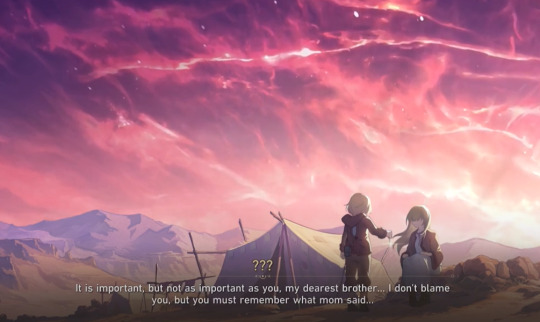
It is for his sister that Aventurine first begins expressing a self-sacrificial nature, and from his sister that this self-sacrifice is reinforced when she uses herself as a shield to help him escape massacre at the hands of the Katicans.
It is also from his sister that Aventurine learns many of the deeply meaningful actions he holds onto to the present day, despite having been so far removed from his own culture.
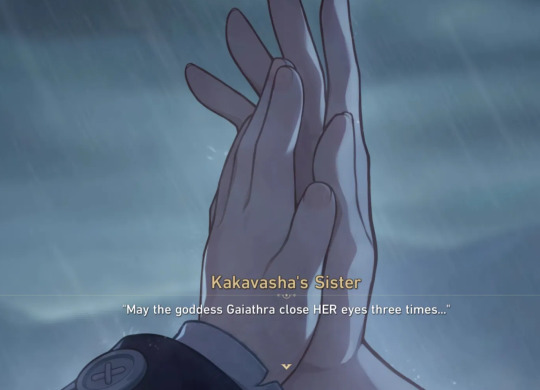
Conversely, every one of Aventurine's early negative experiences on screen appear to have been driven (at least primarily) by men.
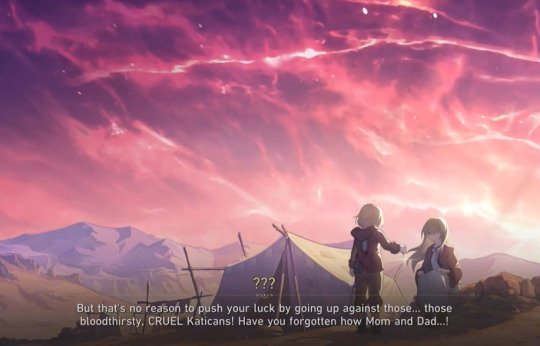
Although the Katican tribe of course would have both men and women, the tribal societies on Sigonia appear to be on the fairly traditional side, with Aventurine's mother staying at the camp with her child while his father was the one to go out and hunt for offerings for Gaiathra. This is also supported by Aventurine asking Jade to take him to her "chief" later on. Therefore, it is likely (although of course not guaranteed) that a majority of the Katicans' army was male, and that Aventurine's early experiences with outsiders consisted almost entirely of indiscriminate pillaging and massacre at the hands of what the Avgin viewed as savage, invading warriors. In separate instances, Aventurine was traumatized by these warrior figures three times--first with the loss of his father, then his mother, and then finally his sister.

And even their hope, supposed to come in the form of the "men in black" from the IPC, completely abandoned them, leaving Aventurine once again betrayed by masculine figures that were supposed to be there to protect him. Led by Oswaldo Schneider, another cruel male authority figure, the Marketing Department of the IPC permitted the wholesale slaughter of Aventurine's people--something which we know Aventurine is now aware of.

Then, of course, the next piece of Aventurine's backstory we're given is his male slave master. I don't really need to say anything about this, do I? This man violated Aventurine's human dignity and bodily autonomy, and forced Aventurine's hand in a life or death battle for which Aventurine still punishes himself mentally, even years in the future.
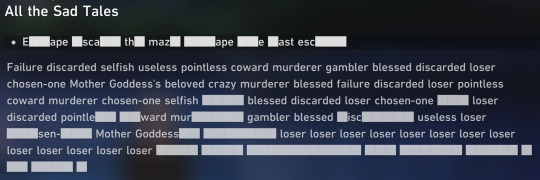
In part to escape the difficulty of his situation and rise to a position where he would have enough resources to--he thought--help his people, Aventurine joins up with the IPC. But when he attempts to make contact with a powerful man in the organization, Diamond, he is instead met by a woman, Jade, who against Aventurine's own expectations determines that she will raise Aventurine up (or use him as a tool, depending on how you currently choose to interpret Jade's motivations), granting him wealth and status beyond his imagination.

(And this line in particular is interesting, because you can take it one of two ways: 1) Aventurine comes from a patriarchal planet that traditionally put men into positions of power [thereby making his own slavery an emasculating act, aligning him further with disenfranchised women]; thus, he is making the assumption that to get anywhere in this organization, he will need to work with a man; or 2) He actually was counting on Jade taking his bet and helping him right from the beginning, because Aventurine perceives women as inherently more likely to protect and aid him than men would be.)
In the end, Jade does exactly as she claims she will, launching Aventurine into a position of power while also closing golden handcuffs around his wrists. She positions herself not only as his supervisor, but as his advocate and ally. She entrusts him with her Cornerstone, a sign of significant faith in his abilities. She even seems to be keenly aware of his bias towards the mother figure, referring to him as "child" in their conversations.

Whether this is genuine or a manipulation tactic can certainly be debated (and I'm not inclined to think at this point that Jade is a genuinely good role model or selflessly supportive person in Aventurine's life), but whatever the case, women are the only people Aventurine even remotely considers to be "in his corner."
We see this even earlier, in Aventurine's call to Topaz. Like with the example of his mother and sister, Aventurine trusts in Topaz's ability implicitly, and considers her above anyone else when it comes to completing the mission in Penacony.
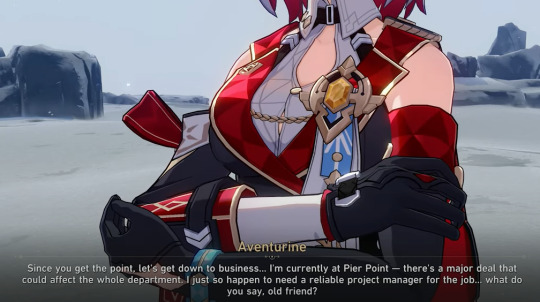
Although of course we don't know if Aventurine has any other friends or allies among the Strategic Investment Department, it seems very likely that Topaz, yet another woman, is the one he is closest with. At the very least, she is the only IPC character (so far) that Aventurine has a complimentary voice line for, one that shows his respect for her talent:

Over and over again, the story aligns Aventurine with female figures in positions of authority, and demonstrates that he is comfortable (although maybe not too comfortable, in the case of Jade) with relying on them and trusting their judgment, just as he did with his mother and sister.
And this pretty much goes off the charts in Penacony, where Aventurine has more involvement with the female cast than virtually any other non-female character (even the Trailblazer!). We set the pattern off right away, with Aventurine immediately being placed into a negotiation situation with Himeko, respecting her role as the Express's leader and working to get himself aligned with the Express by acquiescing to her request for support.

Then there's the fact that Aventurine is the one who finds Robin's body, an event which, although he didn't let it show too much, was almost certainly traumatic for him, given the violent death of his own sister.
Next, twice in Penacony's story, we see Aventurine seek out Sparkle for information. He may not personally like her and her comments may be both racist and dehumanizing, but Aventurine does rely on her--being the only character explicitly seeking her aid, which no one else in Penacony seems to want.
In 2.0...

And in 2.1.
Now, say it with me, guys: Aventurine built an entire portion of his grand plan around the idea that if he looked pathetic enough, a female character would absolutely come and help him. And sure enough, the women come through for him, always! Sparkle gives him the exact last clue he needs to confirm his belief that he could use "Death" to reach the true Penacony, sealing the deal for the rest of his plan.
His plan which also hinged significantly on Black Swan's involvement too, another woman that he views as, if not trustworthy, then at least intelligent and hyper-competent.
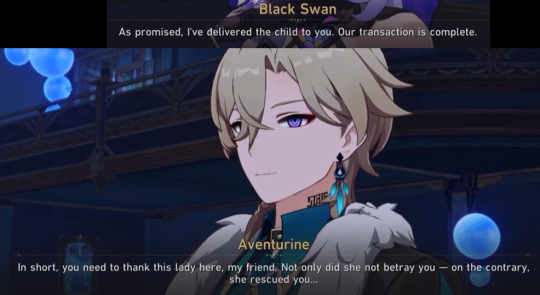
Contrast all this, of course, with the treatment Aventurine receives at the hands of Sunday, the lone opposing male character he faces in Penacony.
Sparkle implies that Sunday would humiliate Aventurine in an unmistakably sexual and degrading way, and Sunday himself professes this same desire to see Aventurine humiliated.
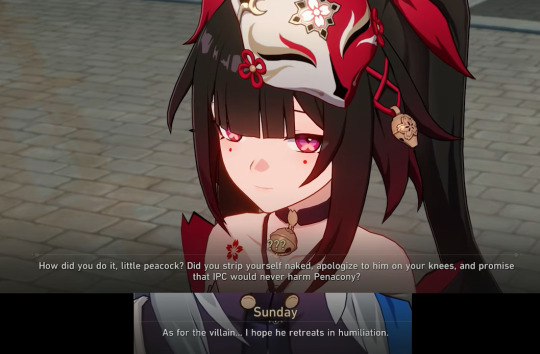
Then we're "treated" to the moment in which Sunday uses the Harmony's (or perhaps actually the Order's?) power against Aventurine, in a scene which is supposed to reflect an interrogation but is also, very clearly, another nonconsensual violation of Aventurine's bodily autonomy and dignity by a man. While ostensibly seeking confirmation of the Cornerstone ruse, Sunday instead subjects Aventurine to unnecessary questions about his past on Sigonia, which recall and force Aventurine to re-endure memories of his trauma.

Even if this is what Aventurine prepared himself for and planned to have happen, the pain he experiences is very real, and he suffers both the physical and emotional consequences of Sunday's assault all the way up to his "Death" and possibly even beyond.
(Also, Sunday fans please don't get too up in arms with me for this; I also like Sunday! It's okay for characters to be morally grey!)
I think there's one other interesting example I would bring up here too, and that's Aventurine's conscious decision to weaponize his own masculinity against the Trailblazer. Through the 2.0 and 2.1 Trailblaze missions, Aventurine deliberately acts in an off-putting manner to the Astral Express crew, particularly the Trailblazer, in order to build up to the 2.1 climax where the Trailblazer is supposed to view him as an unrepentant villain and attack him without hesitation.
In order to achieve this uncomfortable, villainous effect, what does Aventurine do? Exactly what other men have done to him.

This is especially apparent if you're playing Stelle because of the ingrained societal taboo of a man entering a woman's personal space without consent, but even as Caelus, it is very clear that Aventurine is leveraging behaviors typically used to show dominance: In a complete 180 to all Aventurine's other body language in the game (normally quite withdrawn, frequently in defensive postures with his arms crossed or hand behind his back, almost always standing several feet away from other people), Aventurine violates the Trailblazer's personal bubble, looming over them (Caelus was sitting in this cutscene, lol), forcing eye contact, and commanding the space while informing them that they will have no choice.
For someone who was hunted, enslaved, had his movements restricted with chains, and due to his own slight stature has very likely been towered over by others who were intentionally asserting their power over him all his life, it is clear that Aventurine associates dominant, typically more masculine-coded physically-imposing behaviors with discomfort and even villainy.
Any girl who has ever had a man loom over her like this will realize very quickly: Aventurine wanted to make himself scary so he made himself act more like a bad man.
(Yes of course I know "not all men." I'm not saying every man behaves in this domineering way or that women cannot be domineering too, obviously, just that Aventurine had a very specific image in mind when constructing a "villainous persona," and the physically controlling tactics most typically used by aggressive men toward women was his immediate go-to.)
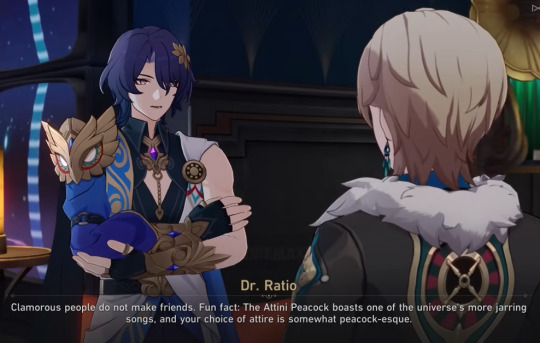
But where does that leave Dr. Ratio, the one male character actually on Aventurine's side?
Frankly, I don't want to derail my post about how intensely Hoyo chose to hammer on the message of "Women will protect you" in Aventurine's story with a discussion about a mlm ship, but the take-away here is going to lead in that direction anyway--so yes, Dr. Ratio is the exception.
What is interesting is that he does not come across as an exception at first, and in fact initially appears as another male character being rude and dismissive to Aventurine. Like, there are still people out there calling Ratio an unrepentant racist for this one.

Of course, it's later clarified that this is an act--likely even these insults were scripted specifically to give Sunday's spying ears the "insight" he needed to exploit Aventurine during the interrogation.
But even though it is an act, Aventurine still has noticeable trouble putting his faith in Ratio. He does genuinely doubt him a few times, despite knowing that they are working together to fool the Family.
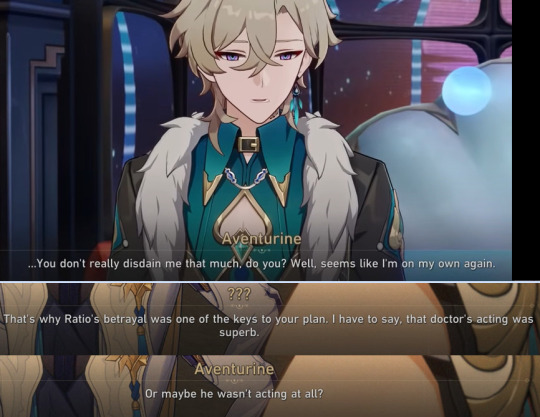
Even his voice line about Ratio confirms that he doesn't think Ratio particularly cares for him; rather, he thinks Ratio simply tolerates him because he's slightly less unintelligent than those around them.
Ultimately, the entire act with Ratio ends up being a mirror of the real scenarios Aventurine has been experiencing with men his whole life (at least as far as we are shown his life). Men abandon him to fend for himself (unwillingly, like his father, or willingly, like Diamond leaving Aventurine to deal with Penacony alone on the inside). Ratio keeps leaving Aventurine completely alone. Men attempt to humiliate him and violate his boundaries (like Sunday and his slave master). Ratio insults Aventurine's appearance and intelligence repeatedly. Men betray him (like Oswaldo Schneider and his men leaving the Avgin to die). Ratio "betrays" him.
I'm not saying when Aventurine devised the plan for their act, he consciously drew up a list of all the ways men had hurt him in the past and had Ratio re-enact them one by one, but like... that's what happened, whether or not Aventurine intended it.
And okay, the shrinking scene in Dewlight Pavilion was just for fun and probably only slightly fetishy, the devs promise; yes, it was supposed to be a joke! ...But it's also not a mistake that this is yet another instance of a male character in a glaringly metaphorical position of power over Aventurine. Aventurine's tiny in this scene! He's completely vulnerable! He's in a dangerous position and the male character could very much hurt him in this moment.

But Ratio doesn't. (In fact, his line here is supposed to be sarcastic, very ha ha--but also, what is Ratio really saying? "I won't do anything to you without your express consent." What a good guy.)
Virtually everything negative that we see in 2.1 is Ratio doing these things as an act at Aventurine's own request. He doesn't actually disdain Aventurine; his own voiceline about Aventurine reinforces that he sees Aventurine as talented and intelligent.
Whatever you think he was apologizing for in their early scene, he's the only person we're ever shown in-game apologizing to Aventurine at all.
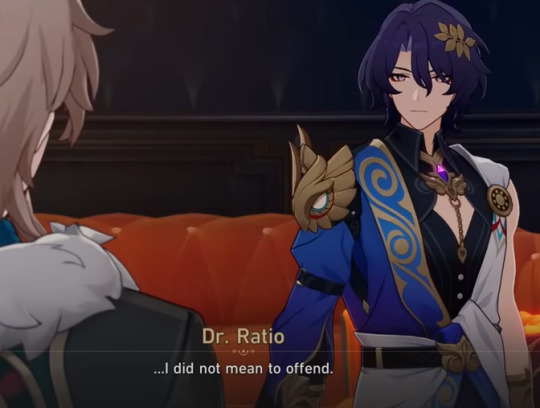
He worked hard to "betray" Aventurine but only as he was instructed to do, and immediately checks in on Aventurine's well-being afterward, even urging him to give up the plan if it becomes too much to handle.
And then, of course, there's the note: "Do stay alive. I wish you the best of luck."
After this point, it cannot be denied that Ratio is unequivocally on Aventurine's side, wants to help him, and is not doing so out of any sense of self-gain but largely because he is a good person who simply cares about Aventurine's fate. By the end of 2.1, it can no longer be doubted that Ratio is the exception to the "gender rule" of Aventurine's life, which--the story shows us again and again--was that guidance, protection, and care for Aventurine come from women, while men repeatedly represent dismissal, betrayal, or pain.
Ratio is, at least as far as Aventurine's story shows us, the proof that men can be good, that things are not as black and white in Aventurine's life as they might appear, and that--if you do choose to ship him with or see Aventurine as attracted to men--his attraction could be validated (and potentially reciprocated) by a male figure who would not bring additional harm to Aventurine's life. Aventurine makes the final decision to live after seeing Ratio's note--the exception to the rule ultimately proves to be the last piece needed to keep him alive.
But I promised I wasn't going to derail my own post about w o m e n, so let me get to the final point, and the one I really wanted to talk about: Although Ratio gets virtually all the credit for "saving" Aventurine in the fandom, Aventurine was actually saved by, you guessed it, another woman.

Not going to lie, the reason I started this post was specifically because I wanted to talk about how Acheron and Aventurine's dynamic was completely unexpected but actually fits flawlessly with the theme of feminine guidance in Aventurine's story.
Despite the fact that Aventurine made Acheron's life much harder and actively used her as a chip in his grand gamble, she doesn't blame or chastise him for those actions. Although she expresses some incredulity that Aventurine is actually that lucky, she then turns around and congratulations him for his ingenuity, immediately supporting him despite the fact that they don't even truly know each other.

Then it gets even more interesting. Acheron, who frequently hits her companions with deep and sometimes very emotionally fraught questions, asks Aventurine: "Have you never wavered?"
We as players know for a fact that Aventurine is constantly wavering, constantly doubting himself, his luck, and whether he'll even live--or even wants to live--to see tomorrow. But we also know that Aventurine is not forthcoming about those truths, refusing to express them to anyone, even himself. The only way we hear those dark truths is through his "future" self (who by the way, is once again another male figure cutting Aventurine down--of course it's himself but it's also, from the player's perspective, once again reinforcing the message that he isn't going to find safety or kindness in an adult male presence). Aventurine almost constantly deflects and diverts when his emotions or struggles are brought to the fore (unless he's divulging them for the specific purpose of allowing someone else to weaponize them). "I'm fine," he says, like a lying liar who lies.
But he doesn't lie to Acheron.

He chooses to be completely candid with her, to lance open the deepest wound of his life--that he can win and win and win and still have lost everything. The glitz and the glamour has all been stripped away here, at the end of everything, and Aventurine finally feels safe enough to admit that he fears he has absolutely nothing in his life worth living for.
And then, we get this direct parallel: Aventurine looks to Acheron, the woman now before him, for guidance, for explanation, exactly as he looked to his sister in the past.
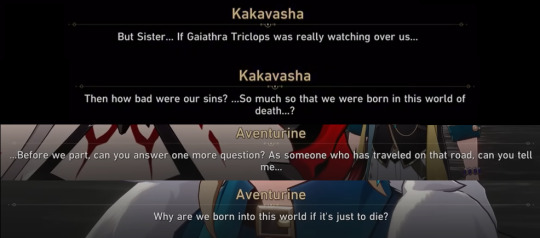
He needs help, he needs answers, and he is continually seeking that help from the female figures in his life, whose support and kindness echo the lost care of his mother and sister.

"Go where you should be," Acheron tells Aventurine, guiding him across the river of death just as his sister insisted that he flee through the rain toward life.
Look guys, Acheron's even the one who reminds Aventurine to look at Ratio's note in the first place because apparently being an emanator of Nihility gives you x-ray vision, but my girl just gets no credit at all for being Aventurine's real savior, come on now!! Yes, Ratio's note was the final reminder Aventurine needed that someone would be waiting for him on the other side, but Aventurine would never have even gotten to the point of being willing to read that note if Acheron hadn't stepped in and provided him an answer to his question.
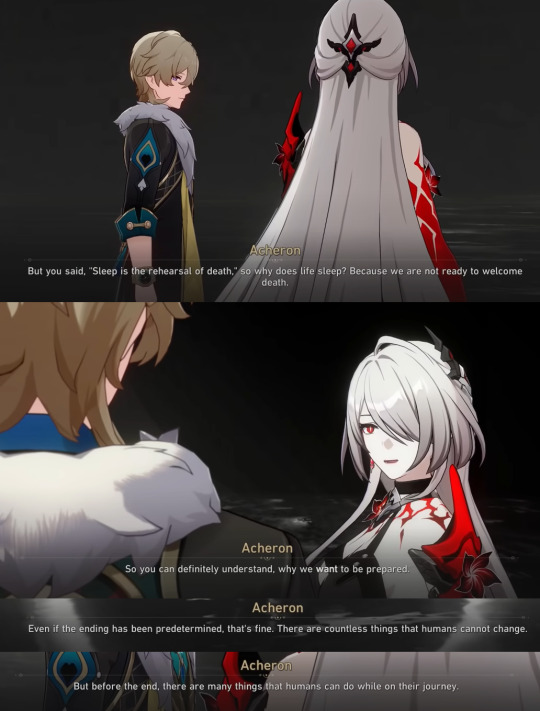
She feeds him back his own answer: "Why does life slumber? To rehearse the death for which we are not currently prepared." It is Acheron who reminds Aventurine that giving into the Nihility is pointless, and that rather than simply embracing a meaningless death, it is up to humanity itself to find and make meaning by living. It's this, not Ratio's note, that Aventurine gives as his reason for choosing to go on when asked by his own younger self. It's Acheron's words that finally give Aventurine an answer--why do we live just to die? Because there are people we can still make proud. Because when we go into death, we should do so with our heads held high, having achieved our own sense of purpose in this life.
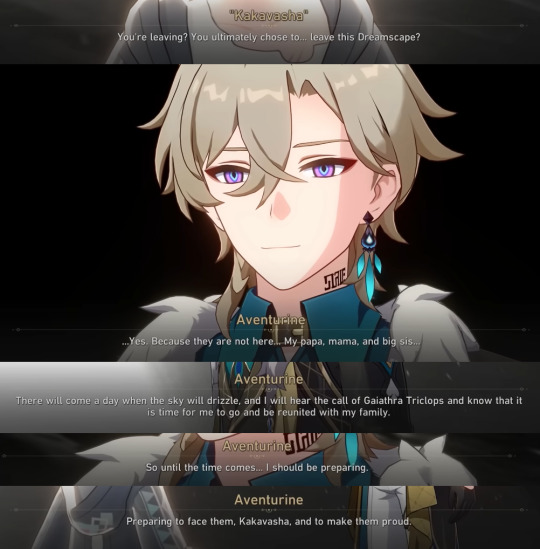
Ratio gave Aventurine a promise: Someone is waiting for you to come back.
But Acheron gave Aventurine a reason: If life is inherently meaningless, doesn't that just mean you are free to give it meaning yourself?
She saved him, as women have been saving him all his life.
Anyway, this has already been horrendously long, but really what I wanted to say is that I think it is absolutely fascinating how consistent Aventurine's writing is when it comes to portraying where his support comes from and who he seeks guidance from. (Psst, just in case you still haven't figured it out, it's women!) In virtually every instance we are shown, we see the message reinforced that women are Aventurine's greatest allies and role models, while male figures are continually positioned to intentionally or unintentionally let him down and cause him distress.
"But women playing the supporting role to a male character is nothing new, Star, why are you so excited by this?"
Because the role women are playing in Aventurine's life is not the subservient supporter and emotional crutch role that female characters all too often play to male counterparts. None of the women in Penacony or Aventurine's past were there to do the emotional labor for him, to be a trophy or prize, or to cater to his needs. They don't exist solely to help him fulfill his character motivations; they aren't following him around waiting for his next request as their only role in the plot.
Instead, with Aventurine's story, we almost have an inversion of gender roles, where the male character eschews the stereotypical "men are leaders, fighters, and stoic heroes" archetype. Instead, no matter how hard he tries to hide it and keep a stiff upper lip, it is clear from 2.0-2.1's story that Aventurine is a deeply insecure, lonely, and explicitly traumatized survivor of genocide, slavery, and exploitation. Unlike most male characters, who are very rarely portrayed as genuine victims--because come on, shouldn't men be strong enough to fight back? Shouldn't men be able to shrug it off when they are hurt, emotionally or physically? (Of course I'm rolling my eyes here!)--Aventurine is belittled, humiliated, emasculated, and victimized on-screen, roles almost exclusively reserved for women, for whom surviving victimization in fiction is seen as noble.
Meanwhile, the women in Aventurine's life take on the roles traditionally given to male characters. They're both emotionally and physically his protectors. Aventurine's sister gave her life to guard his safety; Acheron ensured he could safely pass beyond the river of Nihility into the Primordial Dreamscape. They give him the tools necessary to succeed where he could not succeed on his own. His plan could never have gotten off the ground without Topaz and Jade entrusting their Cornerstones to him. The knowledge and capabilities of the women around him--not their "feminine charms"--are what allow them to help keep Aventurine on the right path even though he does waver. Even women who disrespect him, like Sparkle, still play a positive role in his life, able to provide him insight gained with their own intellect and talents.
When he has no one to rely on and doesn't know what to do, Aventurine is able to continually turn to the women around him, asking for and receiving not servitude or fawning, but their genuine wisdom and guidance.
tl;dr: If nobody else has him, Aventurine knows this random woman he met two minutes ago on the street will have him, because the women in his life literally never let him down.
(It's just so, so good, and ultimately, it should be very clear why Aventurine's story is as popular with women as it is! A+, Hoyo!)
#honkai star rail#aventurine#acheron#topaz hsr#honkai star rail meta#character analysis#there's a bit of#ratiorine#in here too#but mostly I ramble about WOMEN#thematic parallels#thematic parallels everywhere#it's long#I'm sorry but not really#sometimes you act like a normal fan#other times you're me#and write essays that wouldn't be out of place in gender studies class#also I hit the '30 images per post' limit and had to make do#please ignore the terrible merging I did of the photos#don't perceive my MS Paint job
994 notes
·
View notes
Text
Portal 2 is still the perfect game to me. I hyperfixated on it like crazy in middle school. Would sing Want You Gone out loud cuz I had ADHD and no social awareness. Would make fan animations and pixel art. Would explain the ending spoilers and fan theories to anyone who'd listen. Would keep up with DeviantArt posts of the cores as humans. Would find and play community-made maps (Gelocity is insanely fun).
I still can't believe this game came out 12 years ago and it looks like THIS.



Like Mirror's Edge, the timeless art style and economic yet atmospheric lighting means this game will never age. The decision not to include any visible humans (ideas of Doug Rattmann showing up or a human co-op partner were cut) is doing so much legroom too. And the idea to use geometric tileset-like level designs is so smart! I sincerely believe that, by design, no game with a "realistic art style" has looked better than Portal 2.
Do you guys remember when Nvidia released Portal with RTX at it looked like dogshit? Just the most airbrushed crap I've ever seen; completely erased the cold, dry, clinical feel of Aperture.


So many breathtakingly pit-in-your-stomach moments I still think about too. And it's such a unique feeling; I'd describe at as... architectural existentialism? Experiencing the sublime under the shadow of manmade structures (Look up Giovanni Battista Piranesi's art if you're curious)? That scene where you're running from GLaDOS with Wheatley on a catwalk over a bottomless pit and––out of rage and desperation––GLaDOS silently begins tearing her facility apart and Wheatley cries 'She's bringing the whole place down!' and ENORMOUS apartment building-sized blocks begin groaning towards you on suspended rails and cement pillars crumble and sparks fly and the metal catwalk strains and bends and snaps under your feet. And when you finally make it to the safety of a work lift, you look back and watch the facility close its jaws behind you as it screams.
Or the horror of knowing you're already miles underground, and then Wheatley smashes you down an elevator shaft and you realize it goes deeper. That there's a hell under hell, and it's much, much older.
Or how about the moment when you finally claw your way out of Old Aperture, reaching the peak of this underground mountain, only to look up and discover an endless stone ceiling built above you. There's a service door connected to some stairs ahead, but surrounding you is this array of giant, building-sized springs that hold the entire facility up. They stretch on into the fog. You keep climbing.
I love that the facility itself is treated like an android zooid too, a colony of nano-machines and service cores and sentient panel arms and security cameras and more. And now, after thousands of years of neglect, the facility is festering with decomposition and microbes; deer, raccoons, birds. There are ghosts too. You're never alone, even when it's quiet. I wonder what you'd hear if you put your ear up against a test chamber's walls and listened. (I say that all contemplatively, but that's literally an easter egg in the game. You hear a voice.)
Also, a reminder that GLaDOS and Chell are not related and their relationship is meant to be psychosexual. There was a cut bit where GLaDOS would role-play as Chell's jealous housewife and accuse her of seeing other cores in between chambers. And their shared struggle for freedom and control? GLaDOS realizing, after remembering her past life, that she's become the abuser and deciding that she has the power to stop? That even if she can't be free, she can let Chell go because she hates her. And she loves her. Most people interpret GLaDOS "deleting Caroline in her brain" as an ominous sign, that she's forgetting her human roots and becoming "fully robot." But to me, it's a sign of hope for GLaDOS. She's relieving herself of the baggage that has defined her very existence, she's letting Caroline finally rest, and she's allowing herself to grow beyond what Cave and Aperture and the scientists defined her to be. The fact that GLaDOS still lets you go after deleting Caroline proves this. She doesn't double-back or change her mind like Wheatley did, she sticks to her word because she knows who she is. No one and nothing can influence her because she's in control. GLaDOS proves she's capable of empathy and mercy and change, human or not.
That's my retrospective, I love this game to bits. I wish I could experience it for the first time again.
#ramblings#long post#not art#personal#also i know “did glados actually delete caroline” is debated cuz the credits song disputes this#but i like to think she did#it's not sad. caroline died a long time ago#it's a goodbye
2K notes
·
View notes
Text


I'M FUCKING DYINGGGGG
Me when I hate drawing noses and leave it for last
Voldemort who??
Eurymachus design by @messymoonmad
#I can't do this anymoreee#Lineart isn't isn't lineart-ing#This is taking so damn long#But at least this made me cackle#So I will probably finish it in like a week maybe 💀#Eurymachus the twink ever I love him#Why did I think of pringles man#epic fanart#irizz art#irizz rambles
176 notes
·
View notes
Text
The Sage of Truth's heart is driven by the beat of curiosity, so he is used to questions and mysteries catching his fancy with all the ease of a match to a forest. They light a passion that burn him through investigation and calculation straight down to the slow embers of an answer or lack thereof, and even then the warmth of his newfound knowledge sparks a need to share what he has discovered with as many Cookies as possible. The affect that this zest for knowledge has on him is, in itself, an unshakeable Truth.
Despite all this, the Sage can still readily admit that nothing, no question or riddle or impossible formula, has ever captivated him as much as the Truthless Recluse.
The Truthless Recluse has always been a minor fascination of his, from the moment he had first heard of him, but that hadn't bloomed into anything signficant until he had the pleasure of meeting him at the square. The Recluse was both a delightfully complex and undeniably simple Cookie, easy for him to understand yet layered in contradictions.
The Truthless Recluse, whose life purpose is dedicated to his own Truth of protecting Cookies from the cruelty of Truth. A living, breathing riddle.
The Sage had intially nurtured a newborn hope that they would cross paths again in the square, and he had fallen into the habit of searching the crowds that flocked to his lectures for a glimpse of those dark robes, that gloomy aura, but alas! Of course, the Recluse would not grant him that honour more than once.
Eventually, the Sage accepted that if he hoped for another meeting, he would have to approach the Recluse himself. The thought did little to dissuade him, as he was rather experienced in chasing after his own flights of philosophical fancy.
So here he is, making the trek up to the Peak of Truth with only the pale moon to accompany him.
The Sage is confident in his path, and finds the journey itself pleasant overall. It may have been quite a while since he was last here, but he did once hail from this peak himself, long before the Recluse slunk and settled in. As such, he remembers the best routes to take, and has little difficult navigating in the encroaching dark.
He is just past halfway up when a silhouette emerges from the shadows, solemn and blurring together with the rest of their dim surroundings. The Sage's heart, driven by curiosity, doubles its beat, pounding excitedly in his chest.
"Who dares to–" The Recluse asks, voice low and gravelly in an attempt to intimidate, but he stops abruptly, narrowing his eyes at the Sage. "You."
"Yes, yes, it's just me." The Sage smiles, undeterred by the less than warm welcome, doing a little flourished bow before hopping back up into an upright position. "I know it is awfully late for a visit, my friend, but you see–"
"Don't call me that." The Recluse interrupts, somewhat rudely, but the Sage's interest in him allows him to let it go with little fuss. "We are not friends."
"Whyever not?" The Sage asks easily, tilting his head. "Are we not both Cookies, living in accordance to our own personal Truths, just like every other? You know, even a Cookie who does nothing but lie and cheat still has the Truth of their affinity for deception as a central pillar in their life."
"You said something similar already, at the square." The Recluse mutters, his gaze cold and heavy. The Sage welcomes it without a shiver. "About me living by a personal Truth."
"And am I wrong?" The Sage questions back, raising an eyebrow. He is genuinely interested to see if the Recluse can make any sort of substanial refutation.
But the Recluse simply presses his lips together in frustration and glances away. The Sage feels both a curl of satisfaction at his silently begrudging acceptance of his point and a chill of disappointment at the lack of an attempted counter.
His disappointment does not have to last long, as the Recluse returns his piercing gaze to him to make a point of his own. "If every Cookie's life relies on a personal Truth, then Life is just as cruel as Truth." The many eyes on the Recluse's mutated staff blink sluggishly, accusingly, their irises catching the thin moonlight in muddy ripples. "That does not show me any proof that we are friends. Which we are not."
"I only meant that there is nothing to stop us from being friends." The Sage clarifies, though he feels like he was quite clear the first time. "And I have never denied the complexities and, indeed, cruelties of Truth and Life alike. As I have told you before, Truth is imperfect, and I embrace that. You, however, seem to be unable to see past these complexities to accept the positives that Truth brings to the world too."
The Recluse seems unhappy with that, his hand tightening its grip around his staff and his frown deepening. "Did you come here only to give me a lecture?" He snaps, voice soft and brittle. "If I wanted to hear this, I would go to the square you insist on occupying."
"Did you not try to do the same to me, on your single visit to the square?" The Sage asks playfully with a growing grin, paying close attention to the way the Recluse stiffens. He laughs lightly. "Ah, don't think of this as a lecture, please. It's only meant to be a conversation. To be frank, I quite enjoyed our brief exchange back at the square, so I was hoping to get a chance to talk to you again. You seem like you would make a particularly interesting debate partner."
The Recluse huffs, shaking his head. "I have no interest in talking to you any further. This much was already bad enough."
With that, he turns away and tries to slink back into the shadows.
"Surely you aren't completely opposed?" The Sage argues, summoning a brilliant ball of light in his palm and rushing over to the Recluse's side, refusing to let him leave now. "If you were, you wouldn't have been willing to initiate our acquaintanceship first. You were the one responsible for that, when you visited the square."
The Recluse stops walking as the conjured light falls on his shoulders, reeling away and twisting around to glare at the Sage. The reflected light makes his dull eyes seem brighter, almost beautifully so. "I did that solely to stop you from sending dozens to their inevitable ruin by exposing them to the path of Truth." He hisses stubbornly. "If I had known it would be useless, and if I had known you would come chasing after me, I would have stayed far away."
"It is very easy to say that in retrospect, but you can't prove that to be true." The Sage points out with a shrug. "Unfortunately, my heart is rather set on this possible friendship of ours, so I'm afraid the matter is out of your hands now. You're stuck with me!"
The Recluse's expression closes in on itself, returning to a blank slate as he abruptly turns and begins to march off again. The Sage realises immediately that the Recluse hopes to discourage him by ignoring him and carrying on, but the Sage eagerly rises to the challenge.
He falls into step beside him, and the two of them walk together in silence, the Sage's light spilling like a pool of honey around them. The Sage watches the Recluse out of the corner of his eye, as the Recluse resolutely faces forward, acting as if he doesn't exist.
Eventually, the Sage's persistence pays off.
As they are approaching the summit, the Recluse comes to another stop, so sudden that the Sage almost walks into him. The Recluse does not turn back to look at him as he says quietly into the air, "Friendship is ultimately meaningless."
His voice is bitter, heavy with a sense of mourning. The Sage hums in consideration, rounding the Recluse to meet his face, raising his summoned light to envelope the surrounding area in a glow.
"What an intruigingly nihilistic statement!" He declares brightly, clapping his hands together. "It would make a riveting debate topic, if you'd entertain me for just an hour or two. Unless, of course, you worry your Truth will not be able to withstand mine?" The Sage rocks forwards on the balls of his feet, his smile a polite taunt. "After all, not all Truths are made equal. Some are stronger than others."
The Recluse glares at him again, though this time, it is weakened slightly by the growing resignation beginning to creep across his features. "You won't give this up, will you?"
"Of course not!" The Sage grins, hopeful that he seems to be slowly getting through to him. "Giving up is never the best option, you know."
The Recluse scoffs, raising his staff as dark wisps begin to swirl menacingly around it. "Not even if I decide to make you leave me alone by force?"
"Not even then!" The Sage chuckles, folding his arms behind his back as he squints his eyes at the Recluse. "Haven't you heard of me before? I can find an answer to anything and you," he takes a modest step closer, his eyes glittering with delight, "are my latest enigma."
The Recluse stares at him for a moment, his expression unreadable, which only makes the Sage wish to study it further. Finally, the Recluse sighs heavily, the dark energy accumulating around his staff dissipating in an instant.
"Fine." He murmurs, barely a whisper as he continues walking. The Sage lights up, his summoned light flaring along with him, and, taking it as an invitation, he follows after the Recluse to the rhythm of his achingly curious heart.
#quick break from bmb au bc i read that costume story and i had to#loved the implication that sage is still the one who is. for lack of a better word. infatuated with tr first#i did initially have a lot of sage-related rambling in these tags but they got so long i. think i may have to make an analysis post instead#you are all spared... for now#shadowvanilla#vanilla milkshake#pure vanilla cookie#shadow milk cookie#diverging paths au#the biscuit library
271 notes
·
View notes
Text

So does anybody else ever think about how Loop felt the need to demonstrate that the party's deaths wouldn't have any effect on the loops. I know I do but that's besides the point. Anyway I don't think Loop actually needs to bathe, they just like to feel included.
#'but lucabyte didnt you already do a comic with this exact same message? that loop has potentially killed their party intentionally before?'#yes i did absolutely do that thank you for noticing. that is what the cannibalism comic is about. no that was not a metaphor. lol#isat#in stars and time#isat spoilers#in stars and time spoilers#sifloop#isat siffrin#isat loop#in stars and time fanart#isat fanart#lucabyteart#ill ramble elsewhere some other time. maybe in a text post. but. long and short of it: even if you assume the answer to 'how do they know'#is that in sasasap isa got frozen once. theres still the fact that the loops are from sif being too distressed. how far gone does a siffrin#have to be before they can witness a party member die and notice it has no effect. how does loop feel to have planned to kill the party#during act 3. why did they NEED to show sif that. are they trying to preemtively stop them from getting the idea in their head#that maybe that might work? when they're out of all other options? when they just get so frustrated and at wits end?#loop helps in subtle ways through the whole game. and in less subtle ways like begging sif not to use the dagger. and while yes the#overarching reason you need to learn that the loops are tied to sif is because you need to figure out wish craft.... loop doesn't know the#actual mechanics of the loops themselves. just what didn't work. the power of friendship. getting the final hit in. being perfect. etc...#and besides all that.. how did loop feel during that hangout. being so deceitful. especially since before the other shoe drops#sif is enjoying themselves. but they know what's coming the whole time.#as for: why bathing? its the obvious imagery for blood on their hands/washing/never being clean. and is a bit of an inversion of the other#piece i just drew with the other casual closeness and nudity being kind. this one is cruel instead.#anyway tag ramble over ill do a masterpost of all my fanwork with some directors commentary sometime i promise. since i know im often vague
866 notes
·
View notes